The Anti-Reactionary FAQ
October 20, 2013
Edit 3/2014: I no longer endorse all the statements in this document. I think many of the conclusions are still correct, but especially section 1 is weaker than it should be, and many reactionaries complain I am pigeonholing all of them as agreeing with Michael Anissimov, which they do not; this complaint seems reasonable. This document needs extensive revision to stay fair and correct, but such revision is currently lower priority than other major projects. Until then, I apologize for any inaccuracies or misrepresentations.
Contents
0. What is this FAQ?
This is the Anti-Reactionary FAQ. It is meant to rebut some common beliefs held by the political movement called Reaction or Neoreaction.
0.1. What are the common beliefs of the political movement called Reaction or Neoreaction?
Neoreaction is a political ideology supporting a return to traditional ideas of government and society, especially traditional monarchy and an ethno-nationalist state. It sees itself opposed to modern ideas like democracy, human rights, multiculturalism, and secularism. I tried to give a more complete summary of its beliefs in Reactionary Philosophy In An Enormous, Planet Sized Nutshell.
0.1.1. Will this FAQ be a rebuttal the arguments in that summary?
Some but not all. I worry I may have done too good a job of steelmanning Reactionary positions in that post, emphasizing what I thought were strong arguments, sometimes even correct arguments, but not really the arguments Reactionaries believed or considered most important.
In this FAQ, I will be attacking not steel men but what as far as I can tell are actual Reactionary positions. Some of them seem really dumb to me and I excluded them from the previous piece, but they make it in here. Other points from the previous post are real Reactionary beliefs and make it in here as well.
0.2. Do all Reactionaries believe the same things?
Obviously not. In particular, the movement seems to be divided between those who want a feudal/aristocratic monarchy, those who want an absolute monarchy, and those who want some form of state-as-corporation. Even more confusingly, sometimes the same people seem to switch among the three without giving any indication they are aware that they are doing so. In particular the difference between feudal monarchies and divine-right-of-kings monarchies seems to be sort of lost on many of them.
In general, this FAQ chooses two Reactionary bloggers as its foils – Mencius Moldbug of Unqualified Reservations, and Michael Anissimov of More Right. Mencius is probably the most famous Reactionary, one of the founders of the movement, and an exceptionally far-thinking and knowledgeable writer. Michael is also quite smart, very prolific, and best of all for my purposes unusually willing to state Reactionary theories plainly and explicitly in so many words and detail the evidence that he thinks supports them.
Mencius usually supports a state-as-corporation model and Michael seems to be more to the feudal monarchy side, with both occasionally paying lip service to divine-right-of-kings absolutism as well. Part 2 of this FAQ mostly draws from Michael’s feudal perspective and Part 4 is entirely based on Moldbug’s corporation-based ideas.
0.3. Are you going to treat Reaction and Progressivism as real things?
Grudgingly, yes.
One of the problems in exercises like this is how much to take political labels seriously. Both “Reaction” and “Progressivism” are vast umbrella concepts on whose definition no one can agree. Both combine many very diverse ideas, and sometimes exactly who falls on what side will be exactly the point at issue.
Part of Part 3 will be an attempt to define Progressivism, but for now I’m going to just sweep all of this under the rug and pretend that “Reactionary” and “Progressive” (or for that matter “leftist” and “rightist”) have obvious well-defined meanings that are exactly what you think they are.
The one point where this becomes very important is in the discussion over the word “demotist” in Part 2. Although debating the meaning of category words is almost never productive, I feel like in that case I have more than enough excuse.
1. Is everything getting worse?
It is a staple of Reactionary thought that everything is getting gradually worse. As traditional ideas cede to their Progressive replacements, the fabric of society tears apart on measurable ways. Michael Anissimov writes:
The present system has every incentive to portray itself as superior to all past systems. Reactionaries point out this is not the case, and actually see present society in a state of severe decline, pointing to historically high levels of crime, suicide, government and household debt, increasing time preference, and low levels of civic participation and self-reported happiness as a few examples of a current cultural and historical crisis.
Reactionaries usually avoid getting this specific, and with good reason. Now that Michael has revealed the domains in which he is critiquing modern society, we can start to double-check them to see whether Progressivism has indeed sent everything to Hell in a handbasket.

But I must set some strict standards here. To support the Reactionary thesis, I will want to see long-term and unmistakeable negative trends in these indicators. Nearly all Reactionaries agree that the advance of Progressivism has been a long-term affair, going on since the French Revolution if not before. If the Reactionaries can muster some data saying that something has been getting better up until 2005 but declining from 2005 to the present, that doesn’t cut it. If something else was worsening from 1950 to 1980 but has been improving since then, that doesn’t cut it either. I will not require a completely monotonic downward trend, but neither will I accept a blip of one or two years in a generally positive trend as proving all modern civilization is bankrupt.
Likewise, if something has been getting worse in Britain but not the United States, or vice versa, that will not suffice either. Progressivism is supposed to be a worldwide movement, stronger than the vagaries of local politics. I will not require complete concordance between all Western countries, but if the Anglosphere countries, France, Germany, and Japan seem split about fifty-fifty between growth and decay in a certain indicator, blaming Progressivism isn’t going to cut it.
So, without further ado, let’s start where Michael starts: with suicide.
1.1. Is suicide becoming more common?
Here’s the US suicide rate from 1960 to 2002:

In those forty years, considered by many the heyday of the leftist movement, forty years encompassing the Great Society, the civil rights movement, the explosion of feminism onto the public consciousness, the decline of the traditional family, etc, etc… suicide rates dropped about 20%.
What evidence have the Reactionaries cite for their side? Michael cites a New York Times article pointing out that suicide rates rose from 1999 to 2010. Apparently my new job is reminding Reactionaries that they cannot blindly trust New York Times articles to give them the whole truth.
Suicide rates did rise from 1999 to 2010. But if we’re going to blame leftism for rising suicide rates it’s kind of weird that it would choose the decade we had a Republican President, House, Senate, and Supreme Court to start increasing. A more likely scenario is that it had something to do with the GIANT NEVER-ENDING RECESSION going on at the time.
As we mentioned above, since Reactionaries believe that Progressivism has been advancing simultaneously in many different countries it is worthwhile to check whether other nations show the same trends as the United States. If every country that was becoming more Progressive showed increased suicide rates, this would be strong evidence that Progressivism were to blame. But if some Progressive countries experienced lower suicide rates, that would suggest country-specific problems.

In Britain, we find not only that suicide has generally been going down for the past thirty years, but that – as predicted above – there is a bit of an upward tick corresponding with the Great Recession.
Even better, we find that suicide peaked in Britain in 1905 – just after the Victorian period – and has been declining ever since.
I try to be nice. I really do. But I will say it – the Reactionary argument that suicide has been increasing during modernity from a low during some fantasized Victorian Golden Age is unacceptably shoddy.
1.2. Is everyone falling further and further into debt?
Here again the Reactionaries overstate their case. Michael tried to support his point with…

…which shows government debt rising ceaselessly and alarmingly through the simple tricks of not adjusting for inflation or rising GDP. Keep yourself honest by taking those steps, and the situation looks more like this:
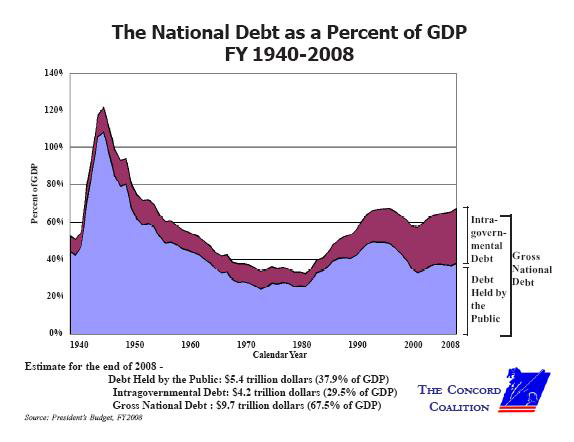
To his credit, Michael fixed this when I pointed it out. But to me, the new graph looks like gradual decrease in debt since World War II up until Reagan’s big military buildup, followed by a gradual retreat from that military buildup. My God, won’t somebody stop Progressivism before it’s too late?!?!
1.3. Is crime becoming worse?
Michael’s statistics for crime deserve more attention:

Question number one: what does this graph mean by “indictable offenses”? This very broad term introduces no fewer than three dangerous biases. First, we have reporting bias – the more police there are and the more active there are, the more crimes get heard about and reported. Second, we have definition bias within individual crimes – for example, larceny in Britain fell by two thirds in 1855, but this was because Parliament passed a law raising the minimum amount of property that had to be larcened for it to count. Third, we have broader definition bias in what is or isn’t a crime – how much of that rise around 1970 was the “indictable offense” of people smoking marijuana, something that was previously neither illegal nor widely available?
Criminologists’ recommended way around this problem is to look at murder. The murder rate tends to track the crime rate in general. Murder isn’t as subject to reporting bias – if someone is killed, the police are going to want to hear about it no matter how understaffed they are. And murder is less subject to changes in definition – dead is dead.
So let’s add the homicide rate to the above chart:

Alas, I can only find the numbers since 1950 rather than 1900. But as we can see, despite the huge rise in “violent crime”, homicide rates stay very steady and perhaps even decline a little over that period.
Question number two: Michael is American. All his other statistics make reference to American numbers. Why does he suddenly switch to Britain when we talk about crime? I won’t impugn his motives – long-term US crime data is really hard to find. But it’s worth pointing out that what there is, is much less sensational:
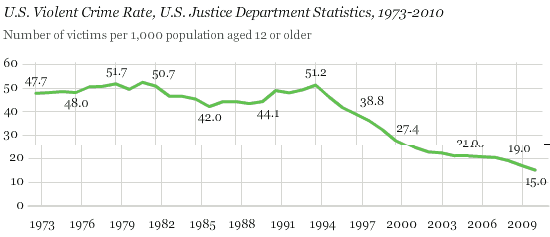
I wish I could find longer-term US crime rate data, but it doesn’t seem to be out there. I can, however, find longer-term homicide data:

We see ups and downs but no general pattern. A Reactionary might cite the apparently very low level of homicides in 1885, but historians pretty much agree that’s a reporting artifact and that the period ending in 1887 had the highest murder rate in American history. In any case, right now we seem to be enjoying a 50 year low. And lest someone bring up that medical technology has advanced enough to turn many would-be murders into attempted murders – which is true – aggravated assaults, the category of crime that would encompass attempted murders, are less than half of what they were twenty years ago. Kind of hard to square with everything getting worse and more violent all the time.
Actually, stopping at 1885 is for losers. Let’s go really long-term. From Marginal Revolution, themselves drawing from Manuel Eisner’s Long-Term Historical Trends in Violent Crime:

We’ve got to go deeper! From HBD Chick, citing Steven Pinker:

1.3.1. But the Victorian Era had amazingly low crime rates! People could walk out in any corner of the country unmolested! Crime was basically a half-forgotten memory!
This is one of Mencius Moldbug’s favorite points. He cites approvingly an 1870s British text which says that
Meanwhile, it may with little fear of contradiction be asserted that there never was, in any nation of which we have a history, a time in which life and property were so secure as they are at present in England. The sense of security is almost everywhere diffused, in town and country alike, and it is in marked contrast to the sense of insecurity which prevailed even at the beginning of the present century. There are, of course, in most great cities, some quarters of evil repute in which assault and robbery are now and again committed. There is perhaps to be found a lingering and flickering tradition of the old sanctuaries and similar resorts. But any man of average stature and strength may wander about on foot and alone, at any hour of the day or the night, through the greatest of all cities and its suburbs, along the high roads, and through unfrequented country lanes, and never have so much as the thought of danger thrust upon him, unless he goes out of his way to court it.
Reactionaries take this idea and run with it – past societies were so well-organized that they had completely eliminated crime, whereas our own democratic government turns a blind eye while thousands of people are beaten and mugged and murdered and…
Again, let’s concentrate on “murdered”. It’s the only crime that gives us a shot at apples-to-apples comparison. So what was the Victorian murder rate?
Homicide is regarded as a most serious offence and it is probably reported more than other forms of crime. Between 1857 and 1890, there were rarely more than 400 homicides reported to the police each year, and during the 1890s the average was below 350. In Victorian England, the homicide rate reached 2 per 100,000 of the population only once, in 1865. Generally, it was about 1.5 per 100,000 falling to rarely more than 1 per 100,000 at the end of the 1880s and declining even further after 1900. These figures do not take into account the significant number of infanticides that went undetected. The statistics for homicide are therefore probably closer to the real level of the offence.
So, Victorian murder rate of between 1 and 2 per 100,000 people. And the current British murder rate? According to the United Nations Office on Drugs and Crime, it stands at 1.2 per 100,000 people, rather lower than the Victorian average.
1.3.1.1. But if the Victorian crime rate was as high or higher than it is today, how come Victorians felt completely safe and thought that crime had been eradicated?
Normally this is where I’d start talking about how we moderns are constantly exposed to so many outrageous and terrifying stories in the media that we don’t realize how good we have it. But in this case that turns out to be explaining away a nonproblem. The Victorians were absolutely terrified of crime and thought they were in the middle of a gigantic crime wave. Here’s Understanding The Victorians on the “garroting panic”:
Violent attacks by strangers were seen as grave cause for concern. There was a disproportionate amount of attention paid to violent nighttime assaults by strangers in urban areas, called “garroting” and similar to what we might call “mugging”. There were garroting panics in 1856 and 1862, in part because of extensive press coverage. In the highest profile case, MP Hugh Pilkington as attacked and robbed in London at one o’clock in the morning on July 17, 1862, after leaving a late session in the House of Commons. Press reports of garroting increased dramatically, and the public quickly became convinced there was a serious problem. Garroting panic was so rampant that it became a topic of satire: Punch published several cartoons of men running from their own shadows or from trees that they were convinced were garrotters.
And A History of Criminal Justice In England and Wales on the same topic:
Crimes of violence were perceived to be on the increase in the 1850s and panic set in when an outbreak of garrotting occurred in various parts of the country in the period from 1856 to 1862. Garrotting involved choking, suffocating, or strangling a victim. During these years, Punch magazine carried a whole series of cartoons and lengthy jokes about the crime, including many eccentric means of defense. One advertisement appeared offering the public an “anti-garrot collar”. This was a steel collar to be hand-fitted round the neck with a large number of sharp steel spikes pointing outwards. Despite such bizarre forms of protection, the offence caused a great deal of fear among the public and it was generally regarded as a very serious threat to law and order. Letters to The Times began to appear from gentlemen who had been so attacked and robbed. In response the judges began to order severe floggings in addition to penal servitude in an attempt to stem the growth of the crime. Their example was then followed by Parliament which, against the wishes of the government, enacted the Security From Violence Act 1863.
So if there was so much panic about crime, how come the person who wrote Moldbug’s favorite book felt Victorian Britain was crimeless?
I guess it all depends on your perspective. I live less than two miles outside Detroit city limits, and I’ve never been the victim of a single crime in my life or even felt particularly threatened. Some people just live sheltered existences.
But apparently most other Americans agree with me. According to Gallup, 89% of American men currently feel safe walking alone at night in the city where they live. If 89% of modern US men feel that way, I’m not surprised Moldbug could find one Victorian guy willing to express the opinion.
1.3.2. Why does this matter again?
For some reason, the Reactionaries have made crime an absolute linchpin of their case. A very large portion of Reactionary thought goes implicitly or explicitly through the argument “Progressives have legitimized minorities, minorities cause crime, crime is destroying our society, therefore Progressivism must be destroyed.”
The extent of the Reactionary obsession with crime never fails to amaze me. Moldbug writes:
Security and liberty do not conflict. Security always wins. As Robert Peel put it, the absence of crime and disorder is the test of public safety, and in anything like the modern state the risk of private infringement on private liberties far exceeds the official of public infringement. No cop ever stole my bicycle.
Desperate times call for desperate measures. On the other hand, non-desperate times call for non-desperate measures. And this is a time when everything is pretty much okay. Murder and violent crime are at historic lows, and almost 90% of American men feel safe walking outside at night. Crime is very nearly a non-issue, and when designing a system of government it is probably a bad idea to give them a blank check to ruin everything else in the pursuit of decreasing it.
1.4. Are people becoming less happy?
Michael’s source for decreasing happiness levels is Blanchflower & Oswald: Well Being Over Time In Britain And The USA. But read the abstract, and you find it’s more complicated: “Reported levels of well-being have declined over the last quarter of a century in the US; life satisfaction has run approximately flat through time in Britain.”
Once again, we find these supposed effects of a global trend are very much limited to individual countries.
Second, when we check the breakdown, we find, as the paper puts it, that “[American] men’s happiness has an upward trend, yet American women’s well-being has fallen through the years.” At a guess, I’d say this is because more women are working full-time jobs. This may be a bit of a victory for Reactionaries, who are no fans of feminism, but it is a very limited victory with little broader implication for other aspects of society. If you’re a man, there’s never been a happier time to be alive.
Further, Blanchflower and Oswald aren’t the only people trying to measure happiness. Ruut Veenhoven has collected 3,651 different happiness studies into a World Database of Happiness. Inglehart, Foa, and Welzel have sorted through some of the data and find that:
Among the countries for which we have long-term data, 19 of the 26 countries show rising happiness levels. In several of these countries – India, Ireland, Mexico, Puerto Rico, and South Korea – there are steeply rising trends. The other countries with rising trends are Argentina, Canada, China, Denmark, Finland, France, Italy, Japan, Luxembourg, the Netherlands, Poland, South Africa, Spain, and Sweden. Three countries, the US, Switzerland, and Norway, show flat trends. Only four countries, Austria, Belgium, UK, and West Germany, show downward trends.
Investigating further:
By far the most extensive and detailed time series comes from the US, and the full series covering the 60 years from 1946 to 2006 shows a flat trend. But the subset from 1946 to 1980 show a downward trend, while the series from 1980 to 2006 shows a rising trend. A similar picture appears from the much scantier British dataset. The entire series from 1946 to 2006 shows a downward trend, but the series from 1980 to the present shows a clear upward trend.
So there you have it. In 19/26 countries, happiness has risen since 1946, and in both America and Britain, it’s been rising since 1980.
1.5. Is time preference decreasing?
Time preference is a mathematical formalization of whether people live only for the moment like the proverbial grasshopper, or build for the future like the proverbial ant. We’d probably prefer if people had pretty low time discounting (ie are more ant-like). Michael claims that in fact we’re becoming more grasshopper-like.
He cites as his source Wang, Rieger and Hans’ How Time Preferences Differ, which is a fascinating study but which does not, as far as I can tell, make anything like the claim Michael says it does. It seems to be entirely about comparing different countries. There is only one thing that looks even close to an intertemporal comparison:
In particular, 68% of our [2011] US sample chose to wait. For comparison, in the survey by Frederick (2005) where he used the same question… only around 41% of students chose to wait.
Here we see people saving more over time, ie becoming more ant-like, although it would be absurd to think this represented a real effect over such a small time period.
Michael may be referring to a claim buried in the study that collectivism is linked to lower discount rates than individualism. This study was done entirely on Israeli Arabs and Jews, with Jews as a proxy for “individualist cultures” and Arabs as a proxy for “collectivist cultures”. Suffice it to say this is not how broad human universals are established. A similar experiment compared Western-primed Singaporeans with Eastern-primed Singaporeans to “conclude” that Confucian cultures had a “longer-term outlook” and thus a lower discount rate. This would be all nice and well except that in the main study, Canadians had a lower discount rate than Japanese, Chinese, Taiwanese, or Koreans. So much for Confucians.
1.6. Is civic participation decreasing?
The argument is simple. Democracy fractures traditionalist societies, destroying civic cohesion, which in turn reduces voter turnout. Therefore, the only way to increase voter turnout is to abolish democracy.
No, actually the argument is more complex, and Michael cites Robert Putnam’s Bowling Alone to make his point for him. Since there is no one statistic for civic participation, I can’t refute it with pure data the same as I tried to do with the others.
But I will point out that Putnam’s own thesis is that it is technology – our options of watching TV, playing video games, or hanging out on the computer – that make us less involved in our communities. He may be right. But blaming the politically neutral force of technology acquits Progressivism.
Even so, a word to defend technology. Right now I am typing a lengthy essay that will be read by a few thousand people. A couple dozen of those will discuss it in the comments. Among those will be people with whom I’ve had interesting discussions, friendships, and even a couple of romantic relationships. Through the ensuing debate, I will meet new people with whom I will likely keep in touch and discuss my extremely niche interests with on a near daily basis for many years to come, forming bizarre but intellectually fecund communities that will inevitably end up with everyone involved moving to the Bay Area and having kids together.
And we are supposed to be upset because the technology that makes this possible has cut down on the number of bowling leagues ? That’s like condemning butterfly metamorphosis for decreasing the number of caterpillars.
1.7. Are international conflicts becoming more frequent?
This isn’t in the paragraph quoted above, but Michael has expressed the opinion to me in person, and anyone familiar with Reactionary thought will recognize this as a staple. The theory is that monarchies had strong international law between them that prevented or settled conflicts quickly, but that democracies have the “sham” international law of the UN (exactly what makes it a sham is never explained) and constantly interfere in one anothers’ business as a continuation of their own internal politics or obsession with human rights.
As far as I know no Reactionary has ever dared to cite statistics that they say support this claim, which is probably for the better. But just for the record, here’s the counterclaim:

You can find a much more exhaustive discussion of this topic here.
1.7.1. What about the Concert of Europe? The great statesman Klemens von Metternich used Reactionary ideas to create a brilliant system that kept peace in Europe for nearly a century!
The Concert of Europe lasted from 1815 to 1914. During that time, Europe suffered – just counting major interstate wars involving Congress of Vienna participants – the French Invasion of Spain, the Crimean War, the Schleswig Wars, the Wars of Italian Independence, Austro-Prussian Wars, the Franco-Prussian War, and, let’s not forget, World War I.
The modern equivalent of the Concert of Europe is the European Union, but built on Progressive rather than Reactionary principles. It has existed from 1951 to 2013 so far, and In those sixty-two years, major interstate wars between EU members have included… well, none.
1.8. Okay, you’ve discussed the trends Michael listed as supporting Reaction, and found them less than convincing. Do you have any trends of your own that you think support more modern societies?
Yes. Most of the graphs below come from 31 Charts That Will Restore Your Faith In Humanity.
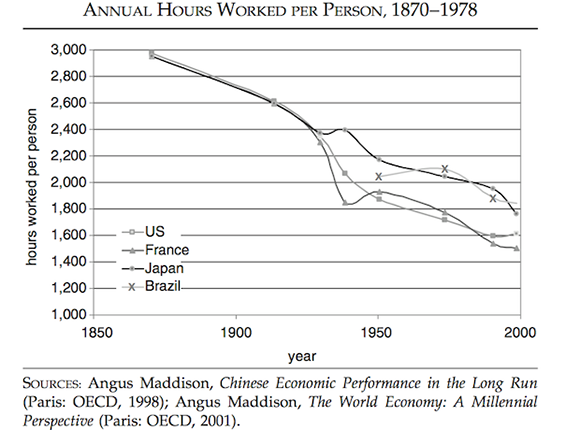
Hours worked per person

Global illiteracy
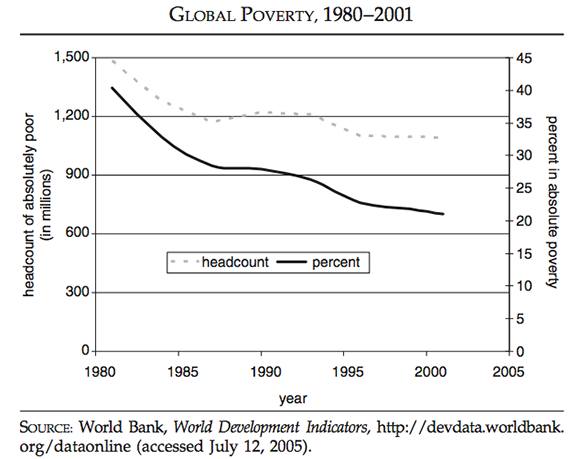
Global poverty
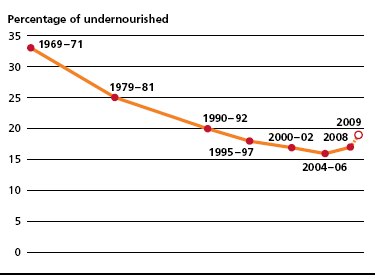
World Hunger
I’m trying to keep things fair by deliberately excluding health care victories since these are at least partially due to technology, but these would include infant mortality dropping a hundredfold, the near elimination of smallpox, diphtheria, polio, tuberculosis, and typhoid from the developed world, the neutralization of AIDS.
Yet in reality, political and social trends played a role here too: for example, smallpox would not have been eliminated without the concerted effort of the WHO and other global health organizations.
1.9. Final thoughts on this section?
Of the seven categories Michael cites as especially supportive of the Reactionary thesis, zero are actually getting worse and several of them appear as best we can tell to be getting better. And I don’t want to beat Michael up too much here, because these are the same sorts of things that other Reactionaries cite, and he got picked on only because he was the one to put them all in one place and claim he had evidence.
Reactionary claims that the modern world shows disappointing performance on indicators of social success turn out to be limited to one cherry-picked country or decade or else just plain made up. The very indicators Reactionaries cite turn out, on closer inspection, to provide strong evidence for things getting better.
Progressives, on the other hand, can point to some amazing victories over the last fifty years, including global poverty cut in half, world hunger cut in half, world illiteracy cut in half, war grinding almost to a halt, GDP quintuple-ing, violent crime collapsing, and self-reported happiness increasing in almost all countries.
1.9.1. Other than crime, few of these points have data before 1950, and the crime ones are highly speculative before that date. Don’t you think that even if things have been getting better for the past few decades, they might have been getting worse over the past few millenia?
Yes. In a few cases this is obviously true. For example, Michael cites good data showing that traditional rural societies have lower suicide rates than our own. And obviously they have lower divorce rates. The same may be true with some of the other points here, though probably not as many as Reactionaries would like.
But I do think it’s important to establish that things have been getting better over the past few decades. For one thing, it suggests a different course of action. If things are constantly declining, we should go into panic mode and try a radical restructuring of everything before it’s too late. If things are getting better every day, we should hang tight and try to nudge forward trends that are already going on.
For another, it suggests a different interpretation. If things keep getting worse, we can attribute it to some process of social decay (since everyone seems to agree social decay is Getting Worse All The Time). If things are getting better now, we may perhaps separate societies into two groups, Traditional and Industrialized, admit that the transition from the first to the second caused a whole lot of problems, but be satisfied that industrialized society is gradually improving and fixing its defects.
So while I accept that traditional rural societies a thousand years ago were better on a number of social metrics, I don’t think that’s particularly actionable. What’s actionable is what’s going on within industrial societies right now, and that seems to be improvements on all levels.
2. Are traditional monarchies better places to live?
2.1. Are traditional monarchs secure?
Much of the Reactionary argument for traditional monarchy hinges on monarchs being secure. In non-monarchies, leaders must optimize for maintaining their position against challengers. In democracies, this means winning elections by pandering to the people; in dictatorships, it means avoiding revolutions and coups by oppressing the people. In monarchies, elections don’t happen and revolts are unthinkable. A monarch can ignore their own position and optimize for improving the country. See the entries on demotism and monarchy here for further Reactionary development of these arguments.
Such a formulation need not depend on the monarch’s altruism: witness the parable of Fnargl. A truly self-interested monarch, if sufficiently secure, would funnel off a small portion of taxes to himself, but otherwise do everything possible to make his country rich and peaceful.
As Moldbug puts it:
Hitler and Stalin are abortions of the democratic era – cases of what Jacob Talmon called totalitarian democracy. This is easily seen in their unprecedented efforts to control public opinion, through both propaganda and violence. Elizabeth’s legitimacy was a function of her identity – it could be removed only by killing her. Her regime was certainly not the stablest government in history, and nor was it entirely free from propaganda, but she had no need to terrorize her subjects into supporting her.
But some of my smarter readers may notice that “your power can only be removed by killing you” does not actually make you more secure. It just makes security a lot more important than if insecurity meant you’d be voted out and forced to retire to your country villa.
Let’s review how Elizabeth I came to the throne. Her grandfather, Henry VII, had won the 15th century Wars of the Roses, killing all other contenders and seizing the English throne. He survived several rebellions, including the Cornish Rebellion of 1497, and lived to pass the throne to Elizabeth’s father Henry VIII, who passed the throne to his son Edward VI, who after surviving the Prayer Book Rebellion and Kett’s Rebellion, named Elizabeth’s cousin Lady Jane Grey as heir to the throne. Elizabeth’s half-sister, Mary, raised an army, captured Lady Jane, and eventually executed her, seizing the throne for herself. An influential nobleman, Thomas Wyatt, raised another army trying to depose Mary and put Elizabeth on the throne. He was defeated and executed, and Elizabeth was thrown in the Tower of London as a traitor. Eventually Mary changed her mind and restored Elizabeth’s place on the line of succession before dying, but Elizabeth’s somethingth cousin, Mary Queen of Scots, also made a bid for the throne, got the support of the French, but was executed before she could do further damage.
Actual monarchies are less like the Reactionaries’ idealized view in which revolt is unthinkable, and more like the Greek story of Damocles – in which a courtier remarks how nice it must be to be the king, and the king forces him to sit on the throne with a sword suspended above his head by a single thread. The king’s lesson – that monarchs are well aware of how tenuous their survival is – is one Reactionaries would do well to learn.
This is true not just of England and Greece, but of monarchies the world over. China’s monarchs claimed “the mandate of Heaven”, but Wikipedia’s List of Rebellions in China serves as instructional (albeit voluminous) reading. Not for nothing does the Romance of Three Kingdoms begin by saying:
An empire long united, must divide; an empire long divided, must unite. This has been so since antiquity.
Brewitt-Taylor’s translation is even more succinct:
Empires wax and wane; states cleave asunder and coalesce.
And of Roman Emperors, only about thirty of eighty-four died of even remotely natural causes, according to this List Of Roman Emperors In Order Of How Hardcore Their Deaths Were.
2.2. Are traditional monarchies more free?
A corollary of Reactionaries’ “absolutely secure monarch” theory is that monarchies will be freer than democracies. Democrats and dictators need to control discourse to prevent bad news about them from getting out, and ban any institutions that might threaten the status quo. Since monarchs are absolutely secure, they can let people say and do whatever they want, knowing that their words and plans will come to naught. We revisit the Elizabeth quote above:
Hitler and Stalin are abortions of the democratic era – cases of what Jacob Talmon called totalitarian democracy. This is easily seen in their unprecedented efforts to control public opinion, through both propaganda and violence. Elizabeth’s legitimacy was a function of her identity – it could be removed only by killing her. Her regime was certainly not the stablest government in history, and nor was it entirely free from propaganda, but she had no need to terrorize her subjects into supporting her.
It is true that Elizabeth did not censor the newspapers, or bludgeon them into publishing only articles favorable to her. But that is less because of her enlightened ways, and more because all newspapers were banned in England during her reign. English language news in the Elizabethan Era had to be published in (famously progressive and non-monarchical!) Amsterdam, whence it was smuggled into England.
Likewise, Elizabeth and the other monarchs in her line were never shy about killing anyone who spoke out against them. Henry VIII, Elizabeth’s father, passed new treason laws which defined as high treason “to refer to the Sovereign offensively in public writing”, “denying the Sovereign’s official styles and titles”, and “refusing to acknowledge the Sovereign as the Supreme Head of the Church of England”. Elizabeth herself added to these offenses “to attempt to defend the jurisdiction of the Pope over the English Church…”. Needless to say, the punishment for any of these was death, often by being drawn and quartered.
But at least she didn’t have a secret police, right? Wrong. Your source here is Stephen Alford’s book on, well, the Elizabethan secret police, although reason.com’s review, The Elizabethan CIA: The Surveillance State In The 16th Century will serve as a passable summary.
2.2.1. How come we perceive traditional monarchies as less oppressive than for example Stalinist Russia?
Well, for one thing Stalin was in a category all of his own, going far beyond rational attempts to maintain his status into counterproductive paranoia. We shouldn’t expect the average communist police state to be Stalinist in its intensity, and so we need not be surprised when traditional monarchies aren’t.
But a more comprehensive answer might draw on a proverb of Oceania’s in 1984: “Animals and proles are free”. Anyone too weak and irrelevant to be dangerous doesn’t suffer the police state’s attention.
Before about the 1600s, the average non-noble neither had nor could have any power. All wealth was locked up in land, owned by nobles, and all military power was locked up in professionals like knights and men-at-arms, who could defeat an arbitrary number of untrained peasants without breaking a sweat.
After about the 1600s, wealth passed into the hands of capitalist merchants – ie non-nobles – and military power became concentrated in whoever could hold a gun – potentially untrained peasants. As a result, kings stopped worrying only about the nobility and started worrying about everyone else.
Or else they didn’t. Remember, all of the longest and most traditional monarchies in history – the Bourbons, the Romanovs, the Qing – were deposed in popular revolts, usually with poor consequences for their personal health. However paranoid and oppressive they were, clearly it would have been in their self-interest to be more so. If monarchy were for some reason to be revived, no doubt its next standard-bearers would not make the same “mistake” as their hapless predecessors.
2.3. Are traditional monarchies less bloody?
Michael Anissimov writes:
Bad kings are not nearly as bad as Demotist/Communist dictators. Bad kings are in a different universe from bad Demotist leaders. There is not even a vague comparison. In the traditional system, kings rely on the aristocracy and clergy for support, and have trouble doing anything without them. For a Demotist leader, there tends to be far fewer checks and balances. They can cause a million deaths in a place like Iraq with a snap of their fingers. Study up on the history of “death by government” to get a better perspective on what I mean. Kings and emperors very rarely, if ever, engage in mass murder against their own people.
2.3.1. Are demotist countries bloodier?
Look up demotist in a dictionary – Wiktionary will do – and you will find it means “one who is versed in ancient Egyptian demotic writing”. Mr. Anissimov’s use is entirely idiosyncratic to Reactionaries, or, to put it bluntly, made up.
It is interesting that every time Reactionaries make this argument, they use this same made-up word. Here’s Moldbug:
Let’s define demotism as rule in the name of the People. Any system of government in which the regime defines itself as representing or embodying the popular or general will can be described as “demotist.” Demotism includes all systems of government which trace their heritage to the French or American Revolutions – if anything, it errs on the broad side.
The Eastern bloc (which regularly described itself as “people’s democracy”) was certainly demotist. So was National Socialism – it is hard to see how Volk and Demos are anything but synonyms. Both Communism and Nazism were, in fact, obsessed with managing public opinion. Like all governments, their rule was certainly backed up by force, if more so in the case of Communism (the prewar Gestapo had less than 10,000 employees). But political formulae were of great importance to them. It’s hard to argue that the Nazi and Bolshevik states were any less deified than any clerical divine-right monarchy.
Why use this made-up word so often?
Suppose I wanted to argue that mice were larger than grizzly bears. I note that both mice and elephants are “eargreyish”, meaning grey animals with large ears. We note that eargreyish animals such as elephants are known to be extremely large. Therefore, eargreyish animals are larger than noneargreyish animals and mice are larger than grizzly bears.
As long as we can group two unlike things together using a made-up word that traps non-essential characteristics of each, we can prove any old thing.
None of Michael or Moldbug’s interlocutors are, I presume, in favor of Stalinism or Nazism. They are, if anything, in favor of liberal democracies such as the United States or Great Britain. Michael and Moldbug cannot bring up examples of these countries killing millions of their own people, because such examples do not exist. So they simply group them in a made-up category with countries that have, and then tar the entire group by association. This is, of course, a riff on the good old Worst Argument In The World.
If there were any nonmotivated reason to group these countries together – if they were really taxonomically related – there would already be a non-made-up word describing this fact.
So the answer to the question – are demotist countries bloodier than monarchies? – is the same as the answer to the question “are eargreyish animals larger than grizzly bears”. The answer is “Here’s a nickel, kid; buy yourself a real category.”
2.3.2. Even if the “demotist” idea was invented for this debate, and even if it has little relevance to liberal democracies, isn’t it at least a good basis for further study?
Remember Moldbug’s definition: “Let’s define demotism as rule in the name of the People. Any system of government in which the regime defines itself as representing or embodying the popular or general will can be described as demotist.”
But “the leaders have to say they rule in the name of the people” is a pretty low bar. King Louis Philippe of France said he ruled in the name of the people:
Louis-Philip wore the title of the King of the French… This title was in contrast to the King of France, which reflected a monarchy’s power over the country, instead of a king’s rule over its people. This title reflects that the king does not take his mandate from God but from the people themselves.
On the other hand, ever read Les Miserables? Yeah, that was him. Eventually the actual people hated him so much that they had a violent revolution and tried to kill him; the king managed to flee the capital in disguise and escape to England, where he died.
Why accept this stupid standard for the definition of “demotist”? Because a more reasonable one – like “elected by the people” or “liked by the people” or “not universally hated by the people and he has to have a giant army to prevent them from immediately killing him” would exclude for example Stalin, the figure Reactionaries are most desperate to paint as “demotist”.
What about the regime which Reactionaries are the second most desperate to paint as “demotist”? For this one let’s bring some class into this essay and quote Erik Maria Ritter von Kuehnelt-Leddihn:
As an honest reactionary I naturally reject Nazism … fascism and all related ideologies which are, in sober fact, the reductio ad absurdum of so-called democracy and mob domination.
You heard it here first. The Nazis were baaaaasically the same as progressive liberal democrats.
To which all I can say is: you know who else opposed “so-called democracy and mob domination?”
By rejecting the authority of the individual and replacing it by the numbers of some momentary mob, the parliamentary principle of majority rule sins against the basic aristocratic principle of Nature
– Adolf Hitler, Mein Kampf, p. 81
2.3.3. Even accepting all that, is Michael’s last sentence even true?
Michael’s argument ends by saying: “Kings and emperors very rarely, if ever, engage in mass murder against their own people.”
I propose a contrary hypothesis – traditional absolutist regimes have always had worse records of massacre and genocide than progressives. However, technology improves efficiency in all things, including murder. And population has been growing almost monotonically for millennia. Therefore, it is unsurprising that more modern absolutist regimes – like Nazism and Stalinism – have higher death counts than older absolutist regimes – like traditional monarchies.
On the other hand, traditional monarchies have some pretty impressive records for killing their own people. Let us take a whirlwind tour of history:
The Albigensian Crusade, run by the French monarchy against its own subjects – with the support of the Catholic Church – may have killed up to a million people, which is pretty impressive considering that at the time there were only about twelve million Frenchmen. As a proportion of total population, this is about the same as the number of Germans who died during World War II, or Chinese who died during the Great Leap Forward.
The Harrying of the North was totally a real historical event and not something I stole from Game of Thrones. William the Conquerer, angry at the murder of a local earl, managed to kill about 100,000 northern Englishmen from 1069-1070, which was probably about 5% of the entire population.
Another 100,000 people died in the 16th century German Peasants’ War, an event which so blended into the general mayhem of the time that you have never heard of it. Actually, the claim that Reactionary regimes have ever been peaceful would have trouble surviving a look merely at Wikipedia’s disambiguation page for Peasants’ War.
Third century BC emperor Qin Shi Huang was not only responsible for the Burning Of Books And Burying Of Scholars, but killed about one million out of his population of twenty million with various purges and forced labor projects, one of which was the Great Wall of China. [This section previously included a paragraph on Chinese warlord Zhang Xianzhong. Despite living in a 17th century monarchy, he held some pretty progressive values and his Reactionary credentials have been challenged. Rather than let his story distract from the more obviously Reactionary murderers above, I will concede the point] But Michael goes even further. He says of democracies that “[with] a Demotist leader, there tends to be far fewer checks and balances. They can cause a million deaths in a place like Iraq with a snap of their fingers.”
Ignoring for a moment the difference between snapping one’s fingers and getting a bill to declare war passed through both houses of a hostile Congress (since Michael certainly does) we note that Michael has just authorized us to also compare monarchies and democracies in their ability to wreak havoc abroad.
On this particular historical tour, we will start with King Leopold of Belgium. Belgium itself was a constitutional monarchy run on a mostly democratic system, and in fact has always been a relatively pleasant and stable place. However, Belgium’s colony, the Congo Free State, was under the direct rule of King Leopold. Not only was it responsible for the deaths of two to fifteen million Congolese – ie about as many Jews as were killed by Hitler – but the manner of those deaths was about as brutal and callous as can be imagined. Wikipedia writes:
Leopold then amassed a huge personal fortune by exploiting the Congo. The first economic focus of the colony was ivory, but this did not yield the expected levels of revenue. When the global demand for rubber exploded, attention shifted to the labor-intensive collection of sap from rubber plants. Abandoning the promises of the Berlin Conference in the late 1890s, the Free State government restricted foreign access and extorted forced labor from the natives. Abuses, especially in the rubber industry, included the effective enslavement of the native population, beatings, widespread killing, and frequent mutilation when the production quotas were not met. Missionary John Harris of Baringa, for example, was so shocked by what he had come across that he wrote to Leopold’s chief agent in the Congo saying: “I have just returned from a journey inland to the village of Insongo Mboyo. The abject misery and utter abandon is positively indescribable. I was so moved, Your Excellency, by the people’s stories that I took the liberty of promising them that in future you will only kill them for crimes they commit.”
This is an especially good example as it describes (we will see later) the ideal Reactionary state – one run by a single person identical to a corporation trying to make as much money as possible off a particular area and possessing overwhelming force.
The story does however have a happy ending – progressive elements within Belgium were so horrified that they forced the king to cede his claim – the colony was then governed by Belgium’s democratically elected legislature, which did such a good job even Mencius Moldbug cannot resist the urge to praise it, and under whose rule Congo was a relatively liveable place up until a native uprising kicked out the Belgians and restored dictatorship.
Another good example of kings and emperors at war is Imperial Japan. This state – again run under principles no Reactionary could fault – accomplished the astounding feat of reducing the Nazis to the second biggest jerks on the Axis side during World War II. During the war, Imperial Japanese troops murdered between three million and ten million foreigners, mostly Chinese. Once again the brutality of their killings is impressive. According to Wikipedia on the Rape of Nanking:
The International Military Tribunal for the Far East estimated that 20,000 women were raped, including infants and the elderly.[40] A large portion of these rapes were systematized in a process where soldiers would search door-to-door for young girls, with many women taken captive and gang raped.[41] The women were often killed immediately after being raped, often through explicit mutilation[42] or by stabbing a bayonet, long stick of bamboo, or other objects into the vagina. Young children were not exempt from these atrocities, and were cut open to allow Japanese soldiers to rape them
Meanwhile, Michael says that “Kings and emperors very rarely, if ever, engage in mass murder” but is absolutely horrified that America caused a million deaths in Iraq (more sober sources say 100,000, of which under 10,000 were civilians directly killed by US forces) while making the utmost effort to avoid unnecessary violence and launching war crimes proceedings against anyone caught employing it.
2.3.4. Conclusion for this section?
Reactionaries believe that monarchs are wise and benevolent rulers, and that it is only “demotists” who engage in genocide and mass murder.
But this argument is based on a con – “demotist” is an unnatural category they made up solely to win this debate. When we look at the governments their opponents actually support – liberal democracies – we find they have a much better history than monarchies.
Further, the Reactionaries fail even on the terms of their own con. Monarchs have a fantastically bloody history, and the regimes they want to paint as demotist really aren’t.
2.4. Are traditional monarchs good leaders?
In his perhaps optimistically named “Ten Objections To Traditionalism And Monarchism, With Answers”, Michael Anissimov asks, with commendable bluntness: “What if the king is an idiot or psycho?” He answers:
Then the prior king appoints a regent to take over the affairs of state on behalf of his successor. There is also a debate within the Reactionary community as to whether adoptive succession is preferable to hereditary succession, which avoids the issue of stupid or crazy children. Such extreme scenarios rarely ever happened during the age of Renaissance European monarchs. One of the greatest statesmen of all time, Klemens von Metternich, strongly influenced the mentally deficient monarch Ferdinand I of Austria during his reign, sat on the regency council, and ran most important affairs, presiding over a hundred years of relative peace in Europe.
We shall start with the theoretical objections before moving on to the empirical counterexamples.
Theoretical objection the first: what if the king doesn’t become an idiot or a psycho until after he is on the throne? The onset of schizophrenia can be as late as twenty-five; later in rare cases. Traumatic brain injury, certain infectious diseases, and normal human personality change can happen at any age. Smart psychopaths will have the presence of mind to avoid revealing their psychosis until they are safely enthroned.
Theoretical objection the second: what if the king seizes power some other way? A decent number of history’s monarchs got tired of waiting and killed their fathers. We would expect these to disproportionately include those who are crazy and evil, not to mention those who think their fathers would take away their power.
Theoretical objection the third: regency councils are historically about the least stable form of government imaginable. Unless everyone has truly commendable morality, either the king kills the regent and seizes power, the regent kills the king and starts a new dynasty, or some third party kills the regent and becomes the new regent. Once again, reading Romance of the Three Kingdoms will prove instructional.
Theoretical objection the fourth: we are counting on the king’s father to object if the king is an idiot or psycho. But a lot of idiotic psychotic kings’ fathers were, in fact, idiots and psychos. The apple doesn’t fall very far from the tree.
Onto the historical counterexamples. Historical counterexample the first: Gaius Julius Caesar Augustus Germanicus, “Caligula” to his friends. Absolutely beloved by the Roman populace. Unclear whether he killed his uncle Tiberius to gain the Empire, or just stood by cackling kind of maniacally as he died. Took power to general acclaim, ruled well for a couple of months, gradually started showing his dark side, and after a year or two reached the point where he ordered a large section of spectators at the colosseum to be thrown into the ring and torn apart by lions because the average amount of tearing-apart-by-lions at a Roman gladiatorial games just wasn’t enough for him.
Historical counterexample the second: Ivan the Terrible. His father died of infection when Ivan was three years old. His mother was named as his regent – kind of a coincidence that the most qualified statesman in the realm would be his mother, but let’s roll with it – but she died of poisoning when Ivan was eight. In this case I’m not sure who exactly is supposed to decide whether he’s an idiot or psycho, and apparently neither were the Russians, because they crowned him Czar in 1547. Ivan was okay until his wife died, at which point he became paranoid and started executing the nobility for unclear reasons, destroyed the economy, and burnt and pillaged the previously glorious city of Novgorod (part of his own kingdom!) with thousands of deaths. According to some sources:
Ivan himself often spent nights dreaming of unique ways to torture and kill. Some victims were fried in giant frying pans and others were flayed alive. At times, he turned on [his death squads] themselves, and subjected their membership to torture and death. In a fit of rage, he murdered his own son; however the guilt of this act obsessed him and he never recovered.
Our story does not end there! Ivan died of a stroke, leaving the throne to his intellectually disabled son. Here at least the system worked – brilliant statesman Boris Godunov was installed as regent and ruled pretty well. He did, however, eventually seize the throne – likely because if he had not seized the throne everyone else would have killed him out of suspicion that he might seize the throne. He died, there was a huge succession squabble, and thus started the Time of Troubles, whose name is pretty self-explanatory.
Historical counterexample the third: Charles II Habsburg of Spain (not to be confused with various other Charles IIs). A strong contender for the hotly contested title of “most inbred monarch in history”, Wikipedia describes him like so:
Known as “the Bewitched” (Spanish: el Hechizado), he is noted for his extensive physical, intellectual, and emotional disabilities—along with his consequent ineffectual rule…
Charles did not learn to speak until the age of four nor to walk until eight, and was treated as virtually an infant until he was ten years old. Fearing the frail child would be overtaxed, his caretakers did not force Charles to attend school. The indolence of the young Charles was indulged to such an extent that at times he was not expected to be clean. When his illegitimate half-brother Don Juan José of Austria, an illegitimate son of Philip IV, obtained power by exiling the queen mother from court, he covered his nose and insisted that the king at least brush his hair
As Charles’s father died when Charles was 3, he was given a regent – his mother ( another case in which the most qualified statesman in the land is the monarch’s mother! What are the odds?!) But when his mother died, Charles took power in his own name and ruled for four years. His only notable achievement during that time was presiding over the largest auto-da-fe in history. He died at age 39. Again quoting Wikipedia:
The physician who practiced his autopsy stated that his body “did not contain a single drop of blood; his heart was the size of a peppercorn; his lungs corroded; his intestines rotten and gangrenous; he had a single testicle, black as coal, and his head was full of water.” As the American historians Will and Ariel Durant put it, Charles II was “short, lame, epileptic, senile, and completely bald before 35, he was always on the verge of death, but repeatedly baffled Christendom by continuing to live.”
Oh, and thanks to the vagaries of self-interested royal dynasties, his passing caused a gigantic succession struggle which drew in all the neighboring countries and caused hundreds of thousands of deaths.
Historical counterexample the fourth: Henry VIII. Really? Yes, really. While perhaps calling him an idiot or psycho goes too far, he certainly thought that marrying confirmed hottie Anne Boleyn and having a son with her was worth converting England to a newly-invented Protestant religion – a decision which killed tens of thousands, displaced some of the country’s oldest and most important institutions, and set the stage for two hundred years of on-and-off warfare. Whether or not you like the Church of England (or, as it was almost named, Psychotic Bastard Religion) yourself, you have to admit this is a sort of poor reason to start a religious revolution.
King Henry wasn’t an idiot or a psycho. He was just a selfish bastard. You can’t expect his father to pick up on that. Even if you could, his father wasn’t exactly Mahatma Gandhi himself. Worst of all, his personality may have changed following traumatic brain injury from a jousting accident – something that could not have been predicted before he took the throne.
This is exactly the sort of problem non-monarchies don’t have to worry about. If Barack Obama said the entire country had to convert to Mormonism at gunpoint as part of a complicated plot for him to bone Natalie Portman, we’d just tell him no.
There’s another important aspect here too. Reactionaries – ending up more culpable of a stereotype about economists than economists themselves, who are usually pretty good at avoiding it – talk as if a self-interested monarch would be a rational money-maximizer. But a monarch may have desires much more complicated than cash. They might, like Henry, want to marry a particular woman. They might have religious preferences. They might have moral preferences. They might be sadists. They might really like the color blue. In an ordinary citizen, those preferences are barely even interesting enough for small talk. In a monarch, they might mean everyone’s forced to wear blue clothing all the time.
You think that’s a joke, but in 1987 the dictator of Burma made all existing bank notes illegitimate so he could print new ones that were multiples of nine. Because, you see, he liked that number. As Wikipedia helpfully points out, “The many Burmese whose saved money in the old large denominations lost their life savings.” For every perfectly rational economic agent out there, there’s another guy who’s really into nines.
2.5. Are traditional monarchies more politically stable?
Reactionaries often claim that traditional monarchies are stable and secure, compared to the chaos and constant danger of life in a democracy. Michael Anissimov quotes approvingly a passage by Stefan Zweig:

Michael’s comment: “[This] does a good job capturing the flavor and stability of the Austrian monarchy… it’s very interesting to read this in a world where America and Europe are characterized by political and economic instability and ethnic strife.”
I am glad Mr. Zweig (Professor Zweig? Baron Zweig?) found his life in Austria to be very secure. But we can’t just take him at his word.
Let’s consider the most recent period of Habsburg Austrian history – 1800 to 1918 – the period that Zweig and the elders he talked to in his youth might have experienced.
Habsburg Holy Roman Austria was conquered by Napoleon in 1805, forced to dissolve as a political entity in 1806, replaced with the Kingdom of Austria, itself conquered again by Napoleon in 1809, refounded in 1815 as a repressive police state under the gratifyingly evil-sounding Klemens von Metternich, suffered 11 simultaneous revolutions and was almost destroyed in 1848, had its constitution thrown out and replaced with a totally different version in 1860, dissolved entirely into the fledgling Austro-Hungarian Empire in 1867, lost control of Italy and parts of Germany to revolts in the 1860s-1880s, started a World War in 1914, and was completely dissolved in 1918, by which period the reigning emperor’s wife, brother, son, and nephew/heir had all been assassinated.
Meanwhile, in Progressive Britain during the same period, people were mostly sitting around drinking tea.
This is not a historical accident. As discussed above, monarchies have traditionally been rife with dynastic disputes, succession squabbles, pretenders to the throne, popular rebellions, noble rebellions, impulsive reorganizations of the machinery of state, and bloody foreign wars of conquest.
2.5.1. And democracies are more stable?
Yes, yes, oh God yes.
Imagine the US presidency as a dynasty, the Line of Washington. The Line of Washington has currently undergone forty-three dynastic successions without a single violent dispute. As far as I know, this is unprecedented among dynasties – unless it be the dynasty of Japanese Emperors, who managed the feat only after their power was made strictly ceremonial. The closest we’ve ever come to any kind of squabble over who should be President was Bush vs. Gore, which was decided within a month in a court case, which both sides accepted amicably.
To an observer from the medieval or Renaissance world of monarchies and empires, the stability of democracies would seem utterly supernatural. Imagine telling Queen Elizabeth I – whom as we saw above suffered six rebellions just in her family’s two generations of rule up to that point – that Britain has been three hundred years without a non-colonial-related civil war. She would think either that you were putting her on, or that God Himself had sent a host of angels to personally maintain order.
Democracies are vulnerable to one kind of conflict – the regional secession. This is responsible for the only (!) major rebellion in the United States’ 250 year (!) history, and might be a good category to place Britain’s various Irish troubles. But the long-time scourge of every single large nation up to about 1800, the power struggle? Totally gone. I don’t think moderns are sufficiently able to appreciate how big a deal this is. It would be like learning that in the year 2075, no one even remembers that politicians used to sometimes lie or make false promises.
How do democracies manage this feat? It seems to involve three things:
First, there is a simple, unambiguous, and repeatable decision procedure for determining who the leader is – hold an election. This removes the possibility of competing claims of legitimacy.
Second, would-be rebels have an outlet for their dissatisfaction: organize a campaign and try to throw out the ruling party. This is both more likely to succeed and less likely to leave the country a smoking wasteland than the old-fashioned method of raising an army and trying to kill the king and everyone who supports him.
Third, it ensures that the leadership always has popular support, and so popular revolts would be superfluous.
If you remember nothing else about the superiority of democracies to other forms of government, remember the fact that in three years, we will have a change of leadership and almost no one is stocking up on canned goods to prepare for the inevitable civil war.
2.6. Are traditional monarchies more economically stable?
Once again, we come to Michael Anissimov’s claims about Austria:
Demotist systems, that is, systems ruled by the “People,” such as Democracy and Communism, are predictably less financially stable than aristocratic systems. On average, they undergo more recessions and hold more debt. They are more susceptible to market crashes. They waste more resources. Each dollar goes further towards improving standard of living for the average person in an aristocratic system than in a Democratic one.
The economic growth of the Austro-Hungarian Empire (1.76% per year) “compared very favorably to that of other European nations such as Britain (1%), France (1.06%), and Germany (1.51%)”.
The growth of Austria-Hungary was higher than that of other European countries for the same reason the growth of sub-Saharan Africa right now is outpacing the growth of America or Europe – it was such a backwater that it had more room to grow.
Urbanization is a decent proxy for industrialization, and we consistently find that throughout the Kingdom of Austria and Austro-Hungarian Empire period, Austria had some of the lowest urbanization rates in Europe, just barely a third those of Britain, and well behind those of France, Spain, Italy, Germany, and Switzerland. In order to find a country as poorly developed as Austria-Hungary, we need to go to such economic powerhouses as Norway, Portugal and Bulgaria.
Nor was its economy especially stable. The Panic of 1873, probably the worst financial depression during the period being discussed and perhaps the worst modern economic crisis before the Great Depression, actually started in Austria-Hungary and only spread from there to the rest of the world. This is especially astounding given Austria-Hungary’s general economic irrelevance at the time.
2.6.1. What about Germany? Isn’t the German Empire a good example of an industrially successful Reactionary country?
I consider the Reactionary credentials of the German Empire extremely open to doubt.
The German Empire was a utopian project created by people who wanted to sweep away the old patchwork system of landed nobility and local traditions that formed the Holy Roman Empire and turn it into a efficient modern state. The Progressive origins of both the Italian and German unification efforts shine through almost every word of a letter from Garibaldi to German unification pioneer Karl Blind:
The progress of humanity seems to have come to a halt, and you with your superior intelligence will know why. The reason is that the world lacks a nation which possesses true leadership. Such leadership, of course, is required not to dominate other peoples, but to lead them along the path of duty, to lead them toward the brotherhood of nations where all the barriers erected by egoism will be destroyed. We need the kind of leadership which, in the true tradition of medieval chivalry, would devote itself to redressing wrongs, supporting the weak, sacrificing momentary gains and material advantage for the much finer and more satisfying achievement of relieving the suffering of our fellow men. We need a nation courageous enough to give us a lead in this direction. It would rally to its cause all those who are suffering wrong or who aspire to a better life, and all those who are now enduring foreign oppression.
This role of world leadership, left vacant as things are today, might well be occupied by the German nation. You Germans, with your grave and philosophic character, might well be the ones who could win the confidence of others and guarantee the future stability of the international community. Let us hope, then, that you can use your energy to overcome your moth-eaten thirty tyrants of the various German states. Let us hope that in the center of Europe you can then make a unified nation out of your fifty millions. All the rest of us would eagerly and joyfully follow you.
The result of this idealistic vision – the destruction of the ancien regime in Germany – was a state much stronger than the traditional-but-weak Holy Roman Empire or anything that had existed in that part of the world before.
Sure, Otto von Bismarck was no hippie, but he was first and foremost a pragmatist, and his empire combined both conservative and progressive elements. It was based on a constitution, had universal male suffrage (only 5 years after the US got same!), elected a parliament, and allowed political parties. Granted, the democratic aspect was something of a facade to cover up an authoritarian core, but real Reactionaries would not permit such a facade, saying it will invariably end in full democracy (they are likely right).
The amazing growth of the German Empire was due to two things. First, the virtues of the German populace, which allow them to continue to dominate the European economy even today with an extremely progressive and democratic government. And second, the catch-up effect mentioned earlier. Germany had been languishing under traditional feudal and aristocratic rule for centuries. As soon as the German Empire wiped away that baggage and created a modern Progressive state, it allowed the economic genius of the Germans to shine through in the form of breakneck-speed economic growth.
2.6.2. Is Progressivism destroying the economy?
Another frequent claim. But remember how Michael said Progressivism went into high gear around the time of the French Revolution in 1789. Here’s a graph of world GDP over time:

To put it lightly, I see no evidence of a decline starting around 1789?
Maybe the effect is just in the United States?

This image is actually even more astounding and important than the above, because it shows how growth keeps to a very specific trendline. On the graph above, the Reactionary might claim that technological advance was disguising the negative effects of Progressivism somehow. Here we see that no second variable that is not perfectly consistent has been interfering with the general economic growth effect.
I literally cannot conceive of a way that the data could be less consistent with the theory that Progressivism inhibits economic growth.
2.7. Are traditional monarchies just in general more successful and nicer places to live?
Great Britain and America have throughout their histories been the two most progressive nations on Earth. They’ve also been, over the past three hundred years or so, the two most successful. Other bright spots in the progressive/successful cluster include 1600s Netherlands, classical democratic Athens, republican Rome, and Cyrus’ Persia. In fact, practically every one of the great nations of history was unusually progressive for its time period, perhaps with the exception of China – which is exceptionally complicated and hard to place on a Western political spectrum. Other possible exceptions might include Philip II’s Spain, Louis XIV’s France, and Genghis Khan’s Mongolia – but the overall trend is still pretty clear.
Limiting our discussion to the present, our main obstacle to a comparison is a deficit of truly Reactionary countries. Reactionaries are never slow to bring up Singapore, a country with some unusually old-fashioned ideas and some unusually good outcomes. But as I have pointed out in a previous post, Singapore does little better than similar control countries, and the lion’s share of its success is most likely due to it being a single city inhabited by hyper-capitalist Chinese and British people on a beautiful natural harbor in the middle of the biggest chokepoint in the world’s most important trade route.
Saudi Arabia also gets brought up as a modern Reactionary state. It certainly has the absolute monarchy, the reliance on religious tradition, the monoethnic makeup, the intolerance for feminist ideals, and the cultural censorship. How does it do? Well, it’s nice and stable and relatively well-off. But a cynic (or just a person with an IQ > 10) might point out that a lot of this has to do with it controlling a fifth of the world’s oil supply. It’s pretty easy to have a good economy when the entire world is paying you bazillions of dollars to sit there and let them extract liquid from the ground. And it’s pretty easy to be stable when you can bribe the population to do what you want with your bazillions of dollars in oil money – in fact, Saudi Arabia is probably that rarest of birds – a Reactionary welfare state.
(Actually, this point requires further remark. Reactionary states tend to be quite rich. In the case of Singapore, Reactionaries trumpet this as a success of Reactionary principles. In the case of Saudi Arabia, that sort of causation is somewhat less credible. I propose an alternative theory: Reactionary states can maintain themselves only by bribing the population not to revolt. These bribes may be literal, as in the case of the Saudi welfare state. Or they may be more figurative – “Look how rich my government has made you – you let me stay in power and I’ll keep up the good work.” China is the classic example of this particular formulation. This is important because contra Moldbug’s inverted pendulum theory it suggests Reactionary regimes will be inherently unstable.)
But getting back to the issue at hand – given all these economic confounders, it’s hard to compare Reactionary and progressive regimes in an even-handed way.
This is par for the course. Political science is notorious for its inability to perform controlled experiments, and no two countries will differ only in their system of government.
2.7.1. If we could perform a controlled experiment pitting reactionary versus progressive ideals, what would it look like?
Well, assuming you were God and had infinite power and resources, you could take a very homogeneous country and split it in half.
One side gets a hereditary absolute monarch, whose rule is law and who is succeeded by his sons and by his sons’ sons. The population is inculcated with neo-Confucian values of respect for authority, respect for the family, and cultural solidarity, but these values are supplemented by a religious ideal honoring the monarch as a near-god and the country as a specially chosen holy land. American cultural influence is banned on penalty of death; all media must be produced in-country, and missionaries are shot on site. The country’s policies are put in the hands of a group of technocratic nobles hand-picked by the king.
The other side gets flooded with American missionaries preaching weird sects of Protestantism, and at the point of American guns is transformed into a parliamentary democracy. Its economy – again at the behest of American soldiers, who seem to be sticking around a sufficient long time – becomes market capitalism. It institutes a hundred billion dollar project to protect the environment, passes the strictest gun control laws in the world, develops a thriving gay culture, and elects a woman as President.
Turns out this perfect controlled experiment actually happened. Let’s see how it turned out!

Talk about your “Dark Enlightenment”!
From the Reactionary perspective, North Korea has done everything right. They’ve had three generations of absolute rulers. They’ve tried to base their social system on Confucianism. They’ve kept a strong military, resisted American influence, and totally excluded the feelings of the peasant class from any of their decisions.

Reactionaries, behold your god.
South Korea, on the other hand, ought to be a basketcase. It’s replaced its native Confucian traditions with liberal Protestant sects, it’s occupied by US troops, it’s gone through various military coups to what the CIA calls a “fully functioning modern democracy”, and it’s so culturally decadent and degraded that it managed to produce Gangnam Style. Yet I don’t think there’s a single person reading this who doesn’t know which one ze’d rather live in.
Yet according to the principles of Reaction (first quote Michael Anissimov, second Mencius Moldbug)
Legally speaking, monarchies tend to have fewer laws, but enforce them more strictly, following Tacitus’ dictum: “The more corrupt the state, the more numerous the laws.” In general, monarchies put more power into the hands of local government. A key argument in favor of monarchy is that leaders tend to have a lower time preference, meaning they have a greater personal stake in the long-term well being of the country, compared to career politicians oriented towards four-year election cycles.
A royal family is a family business. Not one king in European history can be found who ruined his own country to enrich himself, like an African dictator.
North Korea is a family business. And the Kim family has done very very well for itself. But it’s not something I would like to see spread.
3. What is progress?
Reactionaries are not the first to notice – but may be the most obsessive in analyzing – a certain directionality to history. That is, rather than being a random walk across the space of possible values, at least the past three hundred years or so seem to have shown a definite trend. Those who are in favor of this trend call it “progress”. Those who oppose it call it things like “moral decay”.
However, it is notoriously difficult to determine exactly what this trend is and what drives it. A theory to this effect is at the core of what separates Reactionaries from simple conservatives.
In the remainder of this section, I will replace the word “progress” – with its connotations of inevitability and desirability – with the preferred Reactionary term “progressivism” – that is, the political ideology which flows with the historical trend under discussion.
3.1. Might Progressivism be merely a secular strain of some Protestant religion?
Reactionaries seem to agree that Progressivism is a religion. Perhaps Calvinism. From Moldbug:
I prefer “cryptocalvinism” [as a name for progressivism], meaning two things: that, like Calvin and as a direct result of his intellectual heritage, cryptocalvinists are building the Kingdom of God on Earth, a political system that seeks to eradicate every form of unrighteousness; and that they prefer not to acknowledge this characterization of their mission and heritage. Since I’ve changed the name, let me repeat the four ideals of cryptocalvinism: Equality (the universal brotherhood of man), Peace (the futility of violence), Social Justice (the fair distribution of goods), and Community (the leadership of benevolent public servants).
Or perhaps Quakerism. From Isegoria, quoting a different Moldbug theory:
Modern progressivism is in fact a form of secular Quakerism, with its doctrine of the Inner Light only slightly modified.
Or how about Judaism? From Age of Treason:
In a nutshell I object to [Moldbug]’s definition of Universalism, which is what he calls “the faith of our ruling caste”. It’s an important observation, but I think he gets it only half right. He associates Universalism only with Progressivism, which he blames entirely on Christianity. He does not address the Globalist tendencies of our ruling caste, and he pretty much gives Jews a pass… The close alignment of PC with Jewish interests? The Jewish support for Marxism and Bolshevism and hatred of Nazism perhaps?
Reactionaries seem much more certain that Progressivism is religious in origin than they are which religion exactly it originates from. And the differences between Calvinism and Quakerism are not subtle.
Given their total lack of consensus on a matter as basic as which religion, why is it so important to Reactionaries that progressivism be descended from a religious background? Moldbug explains:
[Progressives] believe their ideals are universal, that they can be derived from science and logic, that no reasonable and well-intentioned person can dispute them, and that their practice if applied correctly will lead to an ideal society. I believe that they are arbitrary, that they are inherited from Protestant Christianity, that they serve primarily as a justification for the rule of the cryptocalvinist establishment, or Polygon, and that they are a major cause of corruption, tyranny, poverty and war.
So the reason Reactionaries want the Left to be religious is to disprove the contention that it is based on reason. This would presumably discredit the Left and restore preeminence to Reactionary ideas such as that people should be ruled by a king, live in strong heterosexual nuclear families, avoid sexual promiscuity, and derive their values from fixed traditions rather than modern ideas of self-expression. You know, ideas with no religious background whatsoever.
3.1.1. Stop being snide and answer the question? Might Progressivism, far from deriving from some universal moral principles, actually be an arbitrary and parochial set of Calvinist customs and taboos?
The ideals commonly called progressive predate Calvin by several millennia. Consider the example of Rome. The early Romans not only overthrew their kings in a popular revolution and instituted a Republic, but experienced five plebian secessions (read: giant nationwide strikes aiming at greater rights for the poor). After the first, the Roman government created the position of tribune, a representative for the nation’s poor with significant power in the government. After the third, the government passed a sort of bill of rights guaranteeing the poor protection against arbitrary acts of government. After the fifth, the government passed the Lex Hortensiana, which said that plebians could hold a referendum among themselves and the results would be binding on the entire populace, rich and poor alike. By the later Empire, even slaves were guaranteed certain rights, including the right to file complaints against their masters.
The Empire was remarkably multicultural, even at its very highest levels. Emperor Septimus Severus was half-Libyan and some historians think his appearance might have passed for black in modern America. Emperor Maximinus Thrax was a Goth, Emperor Carausius was Gallic, and Emperor Philip the Arab was… well, take a wild guess. Although Rome did have a state religion, they were extremely supportive of the rights of minorities to continue practicing their own religions, and eventually just tried to absorb everything into a giant syncretistic mishmash that makes today’s “ecumenialism” seem half-hearted in comparison. Although their tolerance famously did not always extend as far as Christianity, when the Romans had to denounce it they claimed it was not a religion but merely a “superstition” – a distinction which itself sounds suspiciously Progressive to modern ears. Indeed, the insistence of Christianity (and Judaism) on a single god, and their unwillingness to respect other religions as equally valid (in a very modern and relativistic way) was a large part of the Roman complaint against them.
The Romans pioneered the modern welfare state, famously memorialized by its detractors as panem et circenses – bread and circuses. Did you know welfare reform was a major concern of Julius Caesar? That ancient Rome probably had a higher percent of its population on the dole than modern New York? That the Romans basically worshipped a goddess of food stamps?
And no discussion of ancient Rome would be complete without mentioning their crazy sex lives. Wikipedia explains that “It was expected and socially acceptable for a freeborn Roman man to want sex with both female and male partners, as long as he took the penetrative role. The morality of the behavior depended on the social standing of the partner, not gender per se. Gender did not determine whether a sexual partner was acceptable, as long as a man’s enjoyment did not encroach on another’s man integrity.” Gay weddings were not uncommon in ancient Rome, and were neither officially banned nor officially sanctioned. Juvenal and Martial both wrote satires condemning what they considered an epidemic of gay marriages during their era. And at least one Roman Emperor – Nero – married a man.
(well, married two men. One as groom and one as bride. And castrated one of them. And probably only married one of them because he was said to have an uncanny resemblance to Nero’s mother. Whom Nero had previously had sex with, then murdered. I didn’t say Nero was normal. Just unusually forward-thinking on the gay marriage issue.)
Moldbug listed the cryptocalvinist ie Progressive program as having four parts:
Equality (the universal brotherhood of man), Peace (the futility of violence), Social Justice (the fair distribution of goods), and Community (the leadership of benevolent public servants)
Yet Equality has a clear antecedent in the plebian secessions of ancient Rome, peace in the Pax Romana, social justice in the Roman welfare system, and community in… well, it’s so broadly defined here that it could be anything, but if we’re going to make it the leadership of benevolent public servants, let’s just throw in a reference to the philosopher-kings of Plato’s Republic (yeah, fine, it’s Greek. It still counts)
3.1.2. Yes, okay, the Romans tried to keep the peace and help the poor and stuff. That’s a pretty weak definition of Progressivism. What really defines Progressivism is this messianic fervor that if we just do this enough, we can create a perfect utopia. That is what these ancient cultures were lacking.
Even if you’ve never read The Republic, you can still get a sense of the utopian striving in the classical world from reading some of the stuff written during the reign of Emperor Augustus. Here’s Dryden’s translation of a passage from the Aeneid:
An age is ripening in revolving fate
When Troy shall overturn the Grecian state…
Then dire debate and impious war shall cease,
And the stern age be soften’d into peace:
Then banish’d Faith shall once again return,
And Vestal fires in hallow’d temples burn;
And Remus with Quirinus shall sustain
The righteous laws, and fraud and force restrain.
Janus himself before his fane shall wait,
And keep the dreadful issues of his gate,
With bolts and iron bars: within remains
Imprison’d Fury, bound in brazen chains;
High on a trophy rais’d, of useless arms,
He sits, and threats the world with vain alarms.
So please, tell me again how utopian desires for peace and social justice were invented wholesale by John Calvin in 1550.
3.2. Is the move toward Progressive social policy masterminded by “the Cathedral”?
Reactionaries have to walk a fine line. They can’t just say “people consider liberal policies, decide they would be helpful, and form grassroots movements pushing for the policies they support”, because that would make leftist policies sound like reasonable ideas pursued by decent people for normal human motives.
But they can’t just say “There’s a giant conspiracy where the heads of all the major Ivy League universities meet at midnight under the full moon”, because that would sound ridiculous and tinfoilish.
So they invent this strange creature, the distributed conspiracy. It’s not just people being convinced of something and then supporting it, it’s them conspiring to do so. Not the sort of conspiring where they talk to one another about it or coordinate. But still a conspiracy! Michael Anissimov describes it like so:
[The Cathedral is] the self-organizing consensus of Progressives and Progressive ideology represented by the universities, the media, and the civil service… the Cathedral has no central administrator, but represents a consensus acting as a coherent group that condemns other ideologies as evil […]
Government and social policy is manufactured in universities, first and foremost at Harvard, followed by Princeton, then Yale, then the other Ivies, Berkeley, and Stanford. As far as politics is concerned, institutions outside of these are pretty much insignificant. Memetic propagation is one-way — it is formulated in the schools and pumped outwards. The universities are not significantly influenced by the outside. The civil servants that make government decisions are either borrowed from universities or almost totally influenced by them. The official mouthpiece of this ideological group is The New York Times, which is the most influential publication in the world outside of the Bible.
So now that we have this formulation of the problem, we can ask some more specific questions.
3.2.1. Are Harvard and the New York Times disproportionately linked to the Progressive ideas that now dominate society?
That depends partly on what “disproportionately” means, of course. But we can make some vague and qualitative observations.
The Roman and Persian Empires held some very Progressive ideals, all without the help of any universities or newspapers whatsoever. Parsimony suggests that whatever process pushed Rome to the left could be doing the same to the modern world.
But a better counterexample might be noting that even modern progressivism predates this institutions. The history of modern Progressivism – even as told by Reactionaries – goes from John Locke to the Glorious Revolution to the American Revolution to the French Revolution to the US Civil War on through John Stuart Mill to the New Deal and the United Nations and civil rights movements and on to the present. While Harvard (est. 1636) does predate all those events, I don’t think even its most fervent critic would accord it any level of influence on world ideas until the 1850s at the earliest. And the Times was founded in 1851. It is hard to chart the precise progress of Progressivism, but I don’t notice any sharp discontinuity at any point. Once again using parsimony, we might expect the forces that promoted Progressivism during the French Revolution and before to be the same forces promoting Progressivism afterwards. This takes any special role of Harvard or the New York Times entirely out of the pictures.
And modern progressivism doesn’t seem linked to Harvard or the Times in space either. New York and Boston are pretty progressive – by American standards. But there’s a whole world out there. Canada is further left than America; Britain is further left than Canada; France is further left than Britain; the Netherlands are further left than France; and Sweden is further left than the Netherlands. Russia and China are complicated, but they’ve certainly had their super-leftist periods. In fact, pretty much the entire developed world is further left than anywhere in the United States, New York and Boston not excepted. This does not seem an entirely recent development; for example, the Netherlands’ liberalism has clear roots in the Dutch Golden Age of the 1600s.
It is true that sometimes a prophet is without honor in his own country. Yet for an American college and a newspaper read almost uniquely by Americans to have affected every other country in the Western world more effectively than they were able to affect the United States seems, well – unexpected.
3.2.2. Do Harvard and the New York Times invent Progressive dogma and then shove it down the throats of a hostile country?
Gay rights will be an interesting test here, because it’s one of the issues on which society has shifted leftward most quickly and dramatically, and because it’s relatively recent so its history should be easy to trace.
Modern gay rights movements trace their history to Germany, a country not known for having Harvard or the New York Times, or for that matter Puritans and Quakers. The German movement included such pioneering activists as Magnus Hirschfeld and Max Spohr, but Germany kind of dropped the ball on gay rights with the whole Nazi thing, and the emphasis shifted to elsewhere in Europe. In America, the movement finally gained steam in the 1960s with a picketing in Philadelphia and a community center in San Francisco, and finally the Stonewall Riots in New York.
I can’t get any good information about Harvard’s position, but the New York Times helpfully has an online archive of every article they have ever published. So what, exactly, was America’s Newspaper Of Record doing while all this was going on? It was helpfully publishing articles like GROWTH OF OVERT HOMOSEXUALITY IN CITY PROVOKES WIDE CONCERN:
The problem of homosexuality in New York became the focus yesterday of increased attention by the State Liquor Authority and the Police Department… The city’s most sensitive open secret – the presence of what is probably the greatest homosexual population in the world and its increasing openness – has become the subject of growing concern of psychiatrists, religious leaders, and the police.
Sexual inverts have colonized three areas of the city. The city’s homosexual community acts as a lodestar, attracting others from all over the country. More than a thousand inverts are arrested here annually for public misdeeds. Yet the old idea, assiduously propagated by homosexuals, that homosexuality is an inborn, incurable disease, has been exploded by modern psychiatry, in the opinion of many experts. It can be both prevented and cured, these experts say.
The overt homosexual – and those who are identifiable probably represent no more than half of the total – has become such an obtrusive part of the New York scene that the phenomenon needs public discussion, in the opinion of a number of legal and medical experts. Two conflict viewpoints converge today to overcome the silence and promote public discussion.
The first is the organized homophile movement – a minority of militant homosexuals that is openly agitating for removal of legal, social, and cultural discriminations against sexual inverts. Fundamental to this aim is the concept that homosexuality is an incurable, congenital disorder (this is disputed by the bulk of scientific evidence) and that homosexuals should be treated by an increasingly tolerant society as just another minority. This view is challenged by a second group, the analytical psychiatrists, who advocate an end to what it calls a head-in-sand approach to homosexuality…
On and on and on it goes in this vein. And that’s not even counting other such wonderful New York Times articles as WOMEN DEVIATES HELD INCREASING – PROBLEM OF HOMOSEXUALITY FOUND LARGELY IGNORED. These aren’t editorials – this is the headlines, the supposedly fact-based objective reporting section. The editorials are worse – I particularly like the one warning that we need to fight increasing gay influence in the theater industry because gays cannot authentically write plays about love or relationships.
Now, to the Times’ credit, it eventually changed its tune and is now mostly in favor of gay rights. That’s fine for the Times but not so good for Reactionaries. The story here is very clearly of a gay rights movement that began as a grassroots push in favor of more tolerance. The New York Times opposed it, but somehow the movement managed to gather steam despite that crushing blow. Eventually its tenets became accepted by more and more people, and one of these late adapters was the New York Times, which now atones for its sin by defending gay rights against even later adapters.
This is not the pattern one would expect if all Progressive ideas were fueled solely by the New York Times’ backing.
3.2.3. Do Harvard and the New York Times successfully impose their values on the rest of America and the world?
Let’s examine exactly how opinions have changed on a host of important political issues. These are taken from the National Election Survey, Pew Research, and Gallup. I’ve tried to avoid cherry-picking – I took every issue I could find, starting from the first year data was available. In cases where I could find two different polls, I kept the one with a longer data series:

Of thirty-four issues that made the cut, opinion shifted to the left on 19 and to the right on 13. There was an average shift of three points leftward per issue. Contrary to Reactionary claims that Americans do not appreciate the extent of the leftward shift affecting the country, in a recent survey based on a similar chart, most people, regardless of political affiliation, slightly overestimated the extent to which values had shifted leftward over the past generation.
Not only is the leftward shift less than people intuitively expect, it does not affect all issues equally. The left’s real advantage is limited to issues involving women and minorities. Remove these, and opinion shifts to the left on 11 issues and to the right on 12. The average shift is one point rightward per issue.
On the hottest, most politically relevant topics, society has moved leftward either very slowly or not at all. Over the past generation, it has moved to the right on gun control, the welfare state, capitalism, labor unions, and the environment. Although the particular time series on the chart does not reflect this, support for abortion has stabilized and may be dropping. This corresponds well with the DW-NOMINATE data that finds a general rightward trend in Congress over the same period. The nation seems to be shifting leftward socially but rightward politically – if that makes any sense.
If the Left had seized control of the government, or the media, or the institutions of the country, we would expect it to do a better job pushing its cherished policies like abortion rights, gun control, environmental protection, et cetera. Instead, beliefs on those issues have remained stable or shifted rightward, while issues like marijuana legalization – an issue more libertarian than progressive, and with minimal support from leftist institutions – succeed wildly. Whatever advantage the left has, it must be something skew to politics, something that institutionalized leftism, from the Democratic Party down to the Humanities Department at Harvard, can neither predict nor control.
3.3. Then where does progress come from?
So the cultural shift of the past few centuries isn’t toward some weird Christian sect. And it wasn’t caused by Harvard or the New York Times. What was it and who did it?
The World Values Survey is the official academic attempt to understand this question. They’ve been polling in eighty countries around the world for thirty years trying to figure out who has what values and how they have been changing. Maybe you’ve seen the most famous summary of their results:

There is no end to the fun one can have with WVS data, and I highly recommend at least Wikipedia’s Catalogue of Findings if not the original studies. But the most important part is that dimensionality analysis finds that answers to value questions cluster together onto two axes: survival vs. self-expression values, and traditional vs. secular-rational values.
Over time, societies tend to move from traditional and survival values to secular-rational and self-expression values. This is the more rigorous version of the “leftward shift” discussed above.
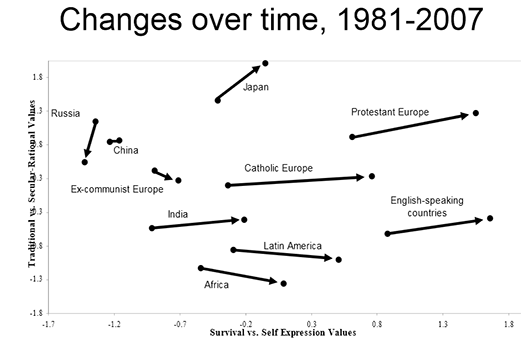
Both within a single time period and between time periods, traditional and survival values are generally associated with poverty, low industrialization, and insecurity. Secular-rational and self-expression values are generally associated with wealth, industrial or knowledge economies, and high security. The difference is not subtle:

And if you want to know why countries are becoming more democratic and less monarchist, it’s hard to get a more direct answer than this graph (although its attempt at a linear fit was a bad idea):
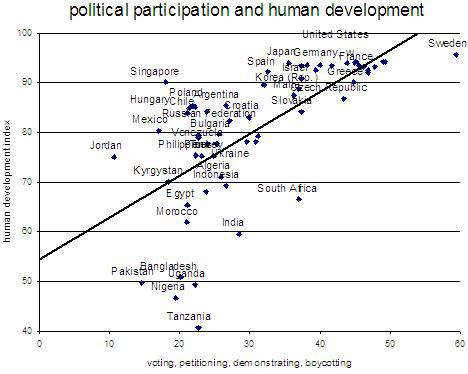
All of this provides a simple and elegant explanation of the distribution of leftism, both in time and space. The most progressive countries today tend to be very wealthy, very peaceful, and comparatively urbanized. The least progressive countries tend to be poor, insecure, and comparatively rural.
Remember Michael Anissimov’s description of the leftward shift above? That the world has been growing further to the left ever since the French Revolution? Take a look at the course of the world economy:

Riiiight about the time of the French Revolution – which also happens to be around the time of the Industrial Revolution – the world economy suddenly shifts into hyperdrive, starting in the USA and Western Europe, spreading to Japan after World War II, and not quite yet having reached Africa or Southeast Asia.
And, well, right about the time of the French Revolution Europe and the USA started shifting to the left, with Japan following after World War II, and Africa and Southeast Asia still lagging behind.
This progressivism/economics link is so obvious that anyone who thinks about it for a few minutes can reach the same conclusion. I wrote “A Thrive/Surive Theory Of The Political Spectrum long before I was familiar with the World Values Survey, but its conclusions match the survey’s in pretty much every respect: rightist values are those most suited for hardscrabble existence where everyone must band together to survive a dangerous frontier; leftist values are those most suited for a secure postscarcity or near postscarcity existence with surplus resources available to devote to more abstract principles.
I’d like to examine one more aspect of this before I stop beating this dead horse, which is the rural/urban divide. The history of industrialization is in many ways the history of urbanization, and the distinction between insecure frontier life and secure postscarcity life mirrors the rural/urban divide. This predicts that more rural countries should be more traditional/survival and more urban countries more secular-rational/self-expression, which in fact we see. Of the countries furthest to the top-right on the WVS diagram, Sweden, Norway and Denmark all have about 85% urban populations. Go down to the three countries at the bottom left – Jordan, Morocco, and Zimbabwe – and despite Jordan’s anomalously high level they’re still averaging about 55%.
This is true even in the United States – the denser a county, city, or state, the more likely it is to lean Democratic, as we can see from this terrible and confusing graph:

Rural counties – those with <200 people per square mile - lean red at about 65%. Once they pass that 200 person mark, they very quickly start leaning blue until the densest areas - true cities, approach 90% Democratic. Or as Dave Troy notes, "98% of the 50 most dense counties voted Obama. 98% of the 50 least dense counties voted for Romney."
This density effect applies even within cities. Here are America's largest cities graphed by density against percent Romney vote:

My sources point out that “graphs of the UK, Australia, and Canada look very similar during the same period, with left voting concentrated in urban and mining districts” and they also mention (just to fend off the inevitable reactionary critique) that “interestingly — and contrary to the much-stated view that Obama purchased the election with welfare, food stamps, and other entitlements, our analysis turned up no statistically significant association between Obama votes and the metro poverty rate and only a very small one for income inequality across metros.”
Why am I making such a big deal of this? Well, here’s America’s percent urban versus percent rural population over the period of time when our values were shifting to the left:

So please. Tell me again how the leftward value shift over the past two hundred years was caused entirely by a sinister conspiracy of Ivy League college professors
3.3.1. Can you give a more detailed explanation of why increasing wealth, technology, and urbanization would lead to the values we call Progressive?
Here are five specific examples.
Multiculturalism is a forced adaptation to the culturally unprecedented situation of large groups of people from different cultures being forced to live and work together. This situation arises because of technology and urbanization. Technology, because more Somalis are going to immigrate to the US when that means booking a plane ticket over the phone than when it meant a six month journey over stormy seas. Urbanization, because it’s much harder to immigrate into an agrarian society where every family knows each other and farmland is at a premium than into an urban society where you can apply for the same factory job as everyone else.
Modern gender roles are a forced adaptation to the existence of cheap and effective contraception, which decouples sex from pregnancy. Teen pregnancy is relegated to people unwilling or unable to use contraception, allowing other women to pursue the same careers as men rather than dropping out of the workforce to become full-time mothers.
The welfare state is a forced adaptation to mobile and urban societies. In agrarian societies, most people owned their own means of production – their farms – and “unemployment” wasn’t a salient concept. It was usually possible to get what you needed through the sweat of your brow, even if that meant chopping down trees to build a log cabin, and there was little sympathy for people who didn’t bother. In urban societies, people need jobs in order to support themselves, and those who cannot get them starve in full pitiful view of everyone else.
Socialized health care is a very big part of the welfare state – probably the majority depending on how you parse the numbers. As recently as a century ago there really wasn’t much in the way of health care technology for people to spend money on, and most people died quickly and simply without having to be kept alive in expensive hospitals for months. As health care gets beyond most people’s ability to afford, and the average lifespan lengthens, there becomes more demand for government to step in and fill the gap.
Secularism is a more viable intellectual option once Science has discovered things like evolution and the Big Bang. Just as “there are no atheists in foxholes”, people with a comfortable urban existence not dependent on the whims of the weather and the plague are less likely to worry about placating the Lord. Multiculturalism means that faiths no are no longer immune to challenge, as Christians and Muslims and Buddhists have to live next to each other and notice how totally unconvinced outsiders are of their ideas. And the movement from closely-knit communities to sprawling cities mean that the local church is no longer ties together your entire actual and possible social network so closely that it can exert pressure on you to conform.
And yes these are just-so stories, but the relationship between all these factors and wealth/urbanization are pretty much beyond dispute – so if it’s not true for these reasons it’s true for reasons no doubt very much like them.
3.4. Do you believe in “Whig history”?
Whig history is an approach to historical study that emphasizes how the past has been groping towards the truths and institutions of the present. It is usually used derisively, in a sense of “Oh, so you think the era in which you were born just happens to be perfect, and everyone else from Aristotle to Galileo was just failing at being an American of 2013.”
There is obviously a strong meaning of the term which cannot help but be false. The past did not share our values, it did not move linearly, and the present moment is neither perfect nor universally superior to other periods.
On the other hand, in a world where progress in areas as diverse as cars, computers, weapons and health care has been blindingly obvious, we shouldn’t place too low a prior on the possibility that there has been progress in social institutions as well. Such progress could be motivated by the same factors that advance other areas.
First, a greater store of empirical results. As time goes on, we have more virtuous examples and terrible warnings. No one pushes for prohibition of alcohol anymore because we’ve seen how that turns out – and in thirty years, people may say the same about other drugs. Very few people push full hold-a-revolution Communism anymore, and for the same reason.
Second, better data. With the invention of statistics and information technology, we now have numbers on everything from income inequality to how different types of policing affect the crime rate. Members of the civil service, politicians, lobbyists, and even voters use these numbers to decide what policies to support. Neither the data nor its interpretation is always unbiased, but it’s a heck of a lot better than the old method of doing whatever your prejudices tell you to do.
Third, social evolution. This is a complicated one, because all evolution is evolution to a niche, the niche is different in the modern world than in the medieval world, and so modern and medieval societies are optimizing for different things. But at the very least, we can say that modern institutions are better adapted to the modern niche than medieval institutions. Those governments that did not adapt were overthrown; those corporations that did not adapt went out of business; those institutions that did not adapt became unpopular and saw their influence shifted to other institutions. Those governments, corporations, and institutions that did adapt prospered and spun off copycats with small variations, and the evolutionary cycle repeated again.
To these three we could add things like greater education, better access to information, and more rational values (you can no longer get away with saying “Follow me because I’m the Messiah”, and that’s probably a good thing). So although it’s not some a priori law of nature that the modern period must be the best period in history, we do have some reasons to expect things to be getting better rather than worse. As Part I pointed out, those expectations have mostly been realized.
3.5. Is America a communist country?
Reactionaries tend to push this line by finding the platform of the US Communist Party from some year well in the past, then pointing out that a lot of their goals were achieved, then noting that since America did what the communists wanted, we are a communist country. Moldbug and others have claimed it, it even has its own Facebook page, but Free Northerner has done by far the most complete job analyzing it and finds that of demands in the 1928 Communist Party platform, 70% of all demands, and 78% of domestic demands, have been met as of 2013.
I don’t want to belittle Free Northerner’s work – he did a great job, he was much more rigorous than I’m about to be, and anyone who writes a blog post on how awesome Turisas is is a friend of mine regardless of his political beliefs.
But although I can’t get my computer to load the platform directly, I notice when I check his transcription that the Communist demands mysteriously lack points like “workers control the means of production” or “all property held in common”, or even “not capitalism”. They do, on the other hand, include policies like “abolition of censorship”, “right to vote for everyone over 18”, and “paid maternity leave during pregnancy”.
Rather than conclude that America is a communist country, a better conclusion might be “the Communist Party of 1928 wasn’t especially “communist”, in the sense that we use that word today.” That’s no surprise. The meaning of words changes over time, and the Cold War made the more moderate elements of communism drop the “communist” label. Using a liberal definition of “communist” to claim that we satisfy the definition, then suggesting we should draw the conclusions and connotations we would from the strict definition of “communist” remains the worst argument in the world. Take out the Worst Argument In The World, and all the Communist Party platform experiment proves is that we support policies like “no child labor” and “free maternity leave” – ie things we already knew.
There’s a second counterargument, though, which is more interesting. Free Northerner writes:
I don’t have time to analyze the Democratic and Republican platform demands of the same year at this time, but I would bet significant sums that less than 80% of their demands were met and upheld by our present time.
I’ll take that bet!
I mistakenly got the Republican platform for 1920 (someone else can double-check 1928 specifically). The Republicans failed to conveniently list their demands in bullet-point format, but from their long manifesto I managed to extract 37 different points:
- Give farms right to cooperative associations
- Protection against discrimination for farmers
- End to unnecessary price fixing that reduces prices of farm products
- Facilitate acquisition of farmland
- Reduce frequency of strikes
- Good voluntary mediation for industry
- Convict labor products out of interstate commerce
- Reorganize federal government
- Simplify income tax
- Federal Reserve free from political influence
- Fair hours and good working conditions for railway workers
- Private ownership of railroads
- Immediate resumption of trade relations with all nations at peace
- Restrict Asian immigrants
- No one becomes citizen until they have taken a test to ensure they are American
- American women do not lose citizenship by marrying an alien
- Free speech, but no one can advocate violent overthrow of the government
- Aliens cannot speak out against government
- End lynching
- Money for construction of highways
- Save national forests and promote conservation
- Reclaim lands
- Increase pay of postal employees
- Full women’s suffrage in all states
- Federal gov should aid states in vocational training
- Physical education in schools
- Centralize gov public health functions
- End child labor
- Equal pay for women
- Limit hours of employment for women
- Encourage homeownership for Americans
- Make available information of housing and town planning
- Americanize Hawaii
- Home rule for Hawaii
- Join international governing body such as League of Nations
- No mandate for Armenia
- Responsible government in Mexico
Not being too familiar with the 1920 political milieu, I don’t really know what they mean by 2, 22, 32. Others seem so broad as to be hard to judge: 4, 6, 8, and 37. That leaves 29 points.
I think the Republicans have achieved 1, 3, 5, 7, 10, 11, 15, 16, 17, 19, 20, 21, 23, 24, 25, 26, 28, 29, 33, 34, 35, and 36 – some unambiguously, others if nothing else by the very sketchy criteria Free Northerner used to rule in commie achievements. They have definitely failed 9, 12, 13, 14, and 30. As for 18, 27, and 31, these seem ambiguous – let’s count them half a point. That means they got 23.5/29 of the points they wanted – 81%. That’s better than the Commies, who only got 70%.
(if we were really trying to do this right, we’d want to have the person who evaluated the success or failure of a party plank blinded to which party it came from. I’ll leave someone else to try this).
So apparently the US is a Republican country even more than it’s a Communist country. I bet if we looked over the Democratic platform for the same time frame, we’d find it was a Republican, Democratic, and Communist country. And if we check the Nazi Party platform, we find that some of the same points Free Northerner counts as Communist victories – abolition of child labor, expansion of old age welfare – are also Nazi Party policies at the same time. So we are, in fact, a Democratic-Republican-Commie-Nazi country.
The alternative is that all parties liked to promise they would throw money at popular feel-good projects. Shorter working hours! Better welfare! Freedom of this! Freedom of that! As the country became richer it was able to support more feel-good policies, and so every party got much of what they wanted.
4. Could a country be ruled as a joint-stock corporation?
This is the plan of Mencius Moldbug, who gets points for being clever and creative rather than trying to rehash 13th century feudalism. I’ve heard different rumors as to whether he still supports it and whether it might or might not be a cover for supporting 13th century feudalism. Nevertheless the idea is interesting and deserves further investigation. However, it is missing some key details and suffers some probably irresolvable conceptual problems.
4.1. Would a joint-stock corporation prevent government decisions based on political tribalism and sacred values, in favor of government decisions based on maximizing economical value?
According to the theory, just as modern corporations like GE successfully remain dedicated to profitability, so America could be sold off in an IPO and restructured as a corporation dedicated to maximizing the value of US land.
But just calling something a corporation doesn’t make it start worrying about profitability. Making its shareholders worry about profitability turns out to be surprisingly hard problem, even though these shareholders themselves would benefit from its profits.
We can imagine two different distributions of shares: either everyone gets one, or only a few aristocrats get one (the degenerate third possibility, where only one person gets them, isn’t really a “joint-stock company”).
The first possibility might be suspected of being democracy: after all, every citizen equally has one share and therefore one vote. Moldbug argues it wouldn’t be: shares are transferable, and citizens have an incentive to maximize the value of their share.
So chew on this: suppose that banning abortion would earn the American government $10 billion dollars a year (how? I don’t know. Let’s just say it does). This corresponds to about $30 for every American.
How many leftists do you think would vote to ban abortion for $30?
What if their $30 was entirely illiquid, only accessible by the one-time event of selling their single share of stock, and would probably be so lost in noise that they would never see tangible evidence of it?
Okay, what if they don’t even know it will give them $30? No doubt Planned Parenthood will author a very scholarly report giving excellent reasons why an abortion ban will make stock shares plummet, and the Catholic Church will author an equally scholarly report giving excellent reasons why it will make everyone rich. Which side will people believe? Why, whichever side matches their natural prejudices, of course! As well ask a Democrat or a Republican whether Obamacare will increase or decrease the deficit.
The only thing that giving everyone a share of American stock would do to politics in the US is allow both the Left and the Right a chance to accuse one another of being secretly in it for the money, while both continue to do what they did before. Perhaps this wouldn’t happen in a country created de novo out of thin air, but US politics are far too entrenched for giving people little stock certificates to help anything.
Anyway, it would take about ten minutes for poor people to sell their shares for easy cash. So this case would immediately degenerate to the second possibility – one where only a small “ruling class” owns all the stock certificates. I think a few Reactionaries have proposed this, and then they can be “nobles”, and make up an “aristocracy”, and…
Hold your horses. Suppose a new ruling class of ten thousand people possess all these certificates.
By definition all of these people will be multibillionaires – once you own one ten thousandth of America, you’ve got it made. And we observe something interesting with multibillionaires – Bill Gates, Warren Buffett, Larry Page. They find other things much more interesting than money. Bill Gates is working on curing malaria. Warren Buffett is trying to give all his money away to charity. Larry Page is working on fascinating but bizarre projects with minimal chance of success during his lifetime. Once you’re a multibillionaire, you need more money less than you need to feel like you’re making some kind of wonderful contribution to the world that will make coming generations revere you.
In other words, these shareholders won’t care about the monetary value of their shares either. Take people like Ted Turner or the Koch brothers, give them a big chunk of the US government, and you expect them to focus on its monetary value just because you’re calling it a stock?
4.2. Would corporate governance at least have lower discount rates?
Likely no.
Do corporations today have low discount rates? Consider the example of Lehman Brothers and other pre-crash investment banks. They happily accepted (and invented) subprime loans that would raise their profits today at the cost of likely financial disaster tomorrow.
More broadly, reflect upon how few companies pursue long-term revolutionary technology. Even though nearly everyone agrees that the future will be less based on fossil fuels, research and development of the likely replacements – from fusion power to solar power to electric cars – is either run by the government or grudgingly performed by corporations only after being promised huge government subsidies. When companies do develop exciting new technologies of their own accord – Google’s Calico, SpaceX’s rockets – they tend to be associated with some already-super-rich Silicon Valley mogul who has enough money to play around, rather than a sober corporation driven by the bottom line or investment opportunities.
A quick reflection on corporate incentives explains this pattern nicely. In the case of Lehman Brothers, traders got bonuses linked to year-on-year profitability, and because of coordination problems each had incentive to maximize his own bonus but no incentive to maximize the solvency of the company as a whole over time.
But why would a CEO or other corporate governor create such a structure? Well, although Reactionaries mock elected politicians for having a four-year time horizon, the average CEO stays only 6.8 years. That’s less than a two-term president. And their own incentives are often also based on bonuses linked to short-term profitability.
In theory, the incentive to increase shareholder value ought to counteract short-term-ist tendencies. But it’s an open question exactly how much of a time horizon is built into stock prices. The average investor holds the average stock for about seven months. Although the hope is that stock prices are set by the market discount rate, at an weighted average cost of capital of 10%, this ideal situation still means that anything happening thirty or more years from now determines only 4% of the stock price.
In the real world, it’s even worse than this – CEOs have strong incentives to try to fool the market into short-term inflation of stock prices at the cost of real future profitability. This is both common and successful. With many investors using formulae that extrapolate from past or present earnings to determine future earnings, it is unsurprising that the CEOs of companies like Lehman Brothers or Goldman Sachs were able to increase both their stock prices and their bonuses for many years until the inevitable letdown came – hopefully on someone else’s watch.
4.3. Could a joint-stock corporate state ensure complete security by mandating cryptographic locks on all its weapons?
This is one of Moldbug’s proposals, and although I think it’s been blown out of proportion and he’s probably a little embarrassed by it now, it gets brought up enough to be worth addressing.
The idea is that shareholders of a corporate state possess cryptographic keys, and that these keys are necessary to fire the weapons in a country’s arsenal. Therefore, any military coup can be stopped in its tracks.
The first question is exactly how these keys work. Suppose there are 100 shareholders. If all keys are necessary, then a single shareholder can paralyze the military. If 51 of the 100 keys are necessary – well, I don’t know if cryptography can implement such a scheme securely, but let’s suppose that it does.
One can raise some peripheral problems with this scheme. Having all your country’s guns connected to the Internet might not be such a good idea…

…and it would be sort of unfortunate if your entire military could be brought down by a clever hacker or Scott Aaronson building a quantum computer in his basement. Further, the guns would have to be either default-on or default-off. If they were default-on, then military conspirators could disable the communications network (or just the radios on their weapons) and have free rein. If they were default-off, then a foreign military could disable the communications network and take over the country because none of the military’s weapons would work.
More important, this only protects against a small subset of rebellions. If every unit has a separate code, it may be able to give loyalist military units the advantage over treasonous units in the case of intramilitary feuding. But it can’t can’t stop a popular revolution – the type where rebels become guerillas and gradually defeat the military in combat. It happened in China, it’s happening right now in Syria, and it could happen again regardless of any cryptographic locks on weapons.
4.4. Would shareholder value maximization be a good proxy for making a country a nice place to live?
Suppose that all the above problems are solved, and we have installed a genuinely self-interested CEO with a long time horizon. Will the new policy of increasing shareholder value really make the country a nicer place as well?
In many ways the equivalence holds. If, as Moldbug suggests, a corporate state’s profits came from land value taxes, and so profits came from increasing land values, then things like decreasing crime, pollution, and poverty would be in the corporate state’s best interests. So would allowing its residents enough freedom to make moving to its land attractive.
But the ways it doesn’t hold are really horrible.
Businesses have an incentive to please their paying customers. As Mitt Romney informs us, a large proportion of Americans don’t pay taxes. In fact, they consume government resources in the form of welfare, while providing no economic value in return. In some cases, these citizens are “fixer-uppers”, people who with enough investment could become productive. In other cases – the indigent elderly, the physically and mentally handicapped, or just people with no useful skills – keeping them around would be a poor financial decision. When regular companies find they have people who aren’t producing value, they “downsize” them. It’s unclear what exactly would be involved in “downsizing” unproductive American citizens, but I’m betting it wouldn’t win any Nobel Peace Prizes.
In a post called The Dire Problem And The Virtual Option, Moldbug discusses some of these problems with his system. He admits that this is a major issues (the titular “dire problem”). With his trademark honesty:
As the King begins the transition from democracy, however, he sees at once that many Californians – certainly millions – are financial liabilities. These are unproductive citizens. Their place on the balance sheet is on the right. To put it crudely, a ten-cent bullet in the nape of each neck would send California’s market capitalization soaring – often by a cool million per neck. And we are just getting started. The ex-subject can then be dissected for his organs. Do you know what organs are worth? This is profit!
But his proposed solutions are bizarre and in many cases incomprehensible:
The simplest, broadest, and most essential prevention against this degenerate result is the observation that the royal government is a government of law, and a government of law does not commit mass murder. For instance, no such government could take office without promising to preserve and defend its new subjects, certainly precluding any such genocide.
A government of law is different from a “law-abiding citizen” or “law-abiding business” in that governments, in addition to occasionally following the law, also get to make the law. If the government had some strong incentive to shoot citizens, it could pass a law allowing it to shoot citizens. It is no more than dozens of other governments have done throughout history. Such a law need not even ruffle the feathers of its more productive “assets”: it could come up with some very clear criteria for whom to shoot and then stick to those criteria scrupulously.
No government could take office without promising to preserve and defend its new subjects in a democracy. Or, to be broader, no government could take office under such conditions as long as it was responsible to its populace and depended on their support. The entire premise of Moldbug’s utopia is a government whose rule is by force and does not depend on the consent of the governed.
If Moldbug’s King needed to gain the consent of the governed before taking power, they wouldn’t stop at making him sign a promise not to shoot anyone. They would make him sign a promise to rule for the good of the people rather than in order to maximize shareholder value. Heck, the last time we tried something like this, the people made the government sign the Bill of Rights.
Here Moldbug wants to have his cake and eat it too. His government will be unconstrained and effective because it doesn’t rule by consent of the people. But when we start examining how horrible an “unconstrained effective government” really would be, he promises that need for the consent of the people would rein it in.
Positing a government that can ignore the age-old constraint of popular consent is far-fetched enough. Positing one where the constraint only arises in those situations where it would be optimal for it to arise, but not otherwise, is just dreaming.
But do we really know it? The explanation that Royal California will not harvest the poor for their organs, because it will have promised not to harvest the poor for their organs, and its most valuable asset is its reputation, while certainly accurate, is too narrow for me. Having established this legalistic defense, let us reinforce it with further realities. More broadly, Royal California will in all cases treat her subjects as human beings. The maintenance of equity, as well as law, is crucial to her reputation. Thus, the Genickschuss is out, with or without the organ harvesting.
Our second layer of protection is that the king will preserve human rights and maintain equity among persons. I wonder if the person writing this has ever read Mencius Moldbug. He has some pretty interesting arguments against human rights and the equity of persons, and I’d be interested in hearing a debate between the two of them.
Carlylean to its core, the ideology of Royal California is that the King is God’s proxy on earth; whatever God would have him do, that is justice; the King, having done his best to divine God’s will, shall see it done. Or else he is no king, but a piece of cardboard, a “Canadian lumber-log.” Clearly, God is not in favor of harvesting the poor for their organs. You’re probably thinking of Huitzilopochtli. So this is another safeguard.
So our third layer of protection – and I am not making this up – is “the will of God”. Don’t you feel safer already? Politicians would never do bad things, even when it is in their own self interest, because God wouldn’t want them to. I think that’s pretty much all the protection citizens might need from their government, don’t you? Let’s write a letter to the libertarians and tell them they can all go home now, God has this one covered.
But I should not be too harsh on Moldbug. He goes on to admit we probably do need a fourth layer of protection, beyond the three he has mentioned. And he even steel-mans the case against him, noting that in a higher-technology world, more and more people will become unproductive until, instead of being a tiny proportion of citizens, it may become the majority or (in the post-Singularity case) everyone who has to worry about this. He gives a few possible solutions:
First, the King has no compunction whatsoever in creating economic distortions that produce employment for low-skilled humans. A good example of such a distortion in the modern world are laws prohibiting self-service gas stations, as in New Jersey or Oregon. These distortions have gotten a bad name among today’s thinkers, because makework is typically the symptom of some corrupt political combination. As the King’s will, it will have a different flavor.
As both a good Carlylean and a good Misesian, the King condemns economism – the theory that any economic indicator can measure human happiness. His goal is a fulfilled and dignified society, not maximum production of widgets. Is it better that teenagers get work experience during the summer, or that gas costs five cents a gallon less? The question is not a function of any mathematical formula. It is a question of judgment and taste. All that free-market economics will tell you is that, if you prohibit self service, there will be more jobs for gas-station attendants, and gas will cost more. It cannot tell you whether this is a good thing or a bad thing.
There may be no jobs for men with an IQ of 80 in Royal California – at least, not in a Royal California whose roads are paved by asphalt rollers. But suppose its roads are paved in brick? A man with an IQ of 80 can lay brick, do it well, and obtain dignity from the task. Nothing whatsoever prevents the King from distorting markets to create demand for the supply he has.
Okay, so the corporate CEO in a government based solely on maximizing shareholder value will decide to trash his own economy in order to provide jobs for the jobless, because that’s just how much corporate CEOs respect human dignity. This is just like corporate CEOs today, who never fire anyone to increase profitability because maintaining jobs is more important. Sure, let’s roll with that.
Since we have abandoned the free market here, we no longer have the free market’s safeguards on job tolerability. Depending on how many make-work jobs the King creates, we will have either an oversupply, an undersupply, or a just-right-supply of unskilled laborers to fill them, which in turn will determine workers’ wages and living conditions. Will the King maintain them at a living wage in good conditions, or at conditions more like the immigrant farm laborers of today? If the latter, I suppose that’s better than killing off the unproductives, but it’s still pretty dystopian. If the former, then that’s quite nice of the King, but I can’t help noting that by instituting useless make-work government-provided jobs for everyone at guaranteed salaries, he has kind of just re-invented Communism, which seems to be the sort of thing I would have expected Reactionaries to try to avoid.
I would compare this idea to the idea of a Basic Income Guarantee. Both cost the economy the same amount of money. Yet in Moldbug’s plan, the poor spend their entire day digging ditches and filling them in again. In a basic income guarantee, the poor spend their days doing whatever they want – producing art, playing games, or working to make themselves more productive. Moldbug may wax rhapsodic about the dignity of work, and he is not entirely wrong, but the sort of work that has dignity is not the sort of work where you dig ditches and fill them in again to earn a government-set paycheck. I wonder if you asked the employed gas station attendant and the unemployed bohemian to rate the level of dignity they feel they have, would this support Moldbug’s thesis?
But never fear, Moldbug has yet another plan:
Or not. The low-browed man of 70 (and remember – for every 130, there is a 70) may still require special supervision. Besides a job, he needs a patron. Productivity he has, but direction and discipline he still requires. His patron may be a charity, or a profitable corporation, or even – gasp – an individual.
In the last case, of course, we have reinvented slavery. Gasp! Since the bond of natural familial kindness is not present in the case of an unrelated ward, the King keeps a close watch on this relationship to protect human dignity. Nonetheless, his wards are farmed out – it is always better to be a private ward than the ward of the State. Bureaucratic slavery is slavery at its worst. Adult foster care, as perhaps we will call it, is a far more human and dignified relationship.
So, we will force people to work for other people against their consent, but it will all be okay and humane, because the government will be keeping “a close watch on this relationship”? Darnit, I liked it better when we were being protected by “the will of God”.
If Moldbug agrees that bureaucratic slavery is “slavery at its worst”, what exactly does he mean when he says the King will “keep a close watch” on these “adult foster care” institutions. Will the King personally go out to each of them and evaluate? That seems like a lot of work in a state of 40 million people. Or will he appoint some government officials to do so, to inspect each institution and make sure it is up to code? If so, how is this different from “bureaucratic slavery”? Is it because the bureaucrats and slaveowners aren’t literally the same people?
Look, Moldbug. I know you don’t think you’re reinventing Communism, but you are.
Luckily he has one more trick up his sleeve:
If a human being cannot support himself in a civilized manner in the King’s economy, which has been carefully tweaked to match labor demand to labor supply, the King does not provide a “safety net” in the 20th-century style, in which he may lounge, sag, bob and fester forever. No – then, it is time for the Virtual Option.
If you accept the Virtual Option – always a voluntary decision, even if you have no other viable options – California will house, feed and care for you indefinitely. It will also provide you with a rich, fulfilling life offering every opportunity to obtain dignity, respect and even social status. However, this life will be a virtual life. In your real life, your freedom will be extremely restricted: to the point of imprisonment. You may even be sealed in a pod.
The result is that the ward (a) disappears from society, and (b) retains or (hopefully) increases his level of dignity and fulfillment. He remains a financial liability, because it is still necessary to prepare his meals and maintain his pod. But other residents of California no longer feel menaced by his presence. For he is no longer present among them.
This doesn’t sound so bad to me, although I’m probably a huge outlier on this and if you actually tried it on people you’d have a civil war on your hands.
But first of all, it’s impossible with current levels of technology, always a bad sign.
Second of all, it’s something that would be equally viable in a democracy and a monarchy. Compare these pods to television. Right now, we pay welfare money to the poor, and, in some cases, they use that money to watch television all day. When they complain, it generally is not due to a lack of television but to a lack of money. If we had virtual reality pods, no doubt the situation would look little different, and conservatives and Reactionaries would be the ones complaining that we pay the poor money to sit in virtual reality pods all day instead of getting a real job.
Third of all, it would probably cost more than any other option. Putting a man in prison – feeding him, boarding him, and putting some guards on the doors to make sure he doesn’t escape costs about $50,000 a year – more than sending that same man to any college in the country. The bulk of the expenses are health care and security – two problems that would be equally dire in these pods. In fact, solving the medical problems associated with prolonged immobility in a virtual environment might be further beyond our current technology than the virtual environment itself.
If the true reason behind the Virtual Option is keeping the poor out of everyday society – even though many of its residents would be old people, disabled people, and the like – why not just offer those people $40,000 a year to live in some nice community out in the country made up solely of other non-working poor? It would be cheaper, more humane, and after a few years with a stable income and a normal life the people involved might end up being unexpectedly productive.
This is, of course, a question one could ask of our own society as well as of Moldbug’s hypothetical. So let’s stick to criticizing Reactionaries, which is more fun and less depressing.
4.5. Would exit rights turn countries into business-like entities that had to compete with one another for citizens?
Exit rights are a great idea and of course having them is better than not having them. But I have yet to hear Reactionaries who cite them as a panacea explain in detail what exit rights we need beyond those we have already.
The United States allows its citizens to leave the country by buying a relatively cheap passport and go anywhere that will take them in, with the exception of a few arch-enemies like Cuba – and those exceptions are laughably easy to evade. It allows them to hold dual citizenship with various foreign powers. It even allows them to renounce their American citizenship entirely and become sole citizens of any foreign power that will accept them.
Few Americans take advantage of this opportunity in any but the most limited ways. When they do move abroad, it’s usually for business or family reasons, rather than a rational decision to move to a different country with policies more to their liking. There are constant threats by dissatisfied Americans to move to Canada, and one in a thousand even carry through with them, but the general situation seems to be that America has a very large neighbor that speaks the same language, and has an equally developed economy, and has policies that many Americans prefer to their own country’s, and isn’t too hard to move to, and almost no one takes advantage of this opportunity. Nor do I see many people, even among the rich, moving to Singapore or Dubai.
Heck, the US has fifty states. Moving from one to another is as easy as getting in a car, driving there, and renting a room, and although the federal government limits exactly how different their policies can be you better believe that there are very important differences in areas like taxes, business climate, education, crime, gun control, and many more. Yet aside from the fascinating but small-scale Free State Project there’s little politically-motivated interstate movement, nor do states seem to have been motivated to converge on their policies or be less ideologically driven.
What if we held an exit rights party, and nobody came?
Even aside from the international problems of gaining citizenship, dealing with a language barrier, and adapting to a new culture, people are just rooted – property, friends, family, jobs. The end result is that the only people who can leave their countries behind are very poor refugees with nothing to lose, and very rich jet-setters. The former aren’t very attractive customers, and the latter have all their money in tax shelters anyway.
So although the idea of being able to choose your country like a savvy consumer appeals to me, just saying “exit rights!” isn’t going to make it happen, and I haven’t heard any more elaborate plans.
5. Are modern ideas about race and gender wrongheaded and dangerous?
The past century has seen a huge opening up of racial and sexual norms, as a closed-minded traditional society willing to dismiss everything against their personal morals as disgusting or evil started first discussing and later embracing alternative ideas.
This was followed by a subsequent closing back up of those norms, as society decided it was definitely right this time, and this time for real anyone who brought up any alternative possibilities was definitely disgusting and evil.
Reactionaries deserve kudos for lampshading these taboos and pointing out various modern hypocrisies in a frank and honest way. But to invert an old saying, I will defend to the death their right to say it, but disagree with what they say.
5.1. Are modern women sluts?
This is a surprisingly important question in Reactionary thought. Just to prove I’m not strawmanning:
So you might say, Bryce, if you want an objective and useful definition of the word slut, you would have to conclude that most Western women are sluts. That’s not good. And I say “Exactly.”
Obviously democracy is not working, is failing catastrophically. The productive are outvoted by the gimmedats, in large part non asian minorities and white sluts.
Why would you take a slutty girl seriously? Once she accepted slut into her life, keep her out of yours. It is rare for a slut to truly reform so I would not even take the chance. Once a slut, always a slut. Do you really want your kids coming out the same place 10 other men have gone into? “But doesn’t that pretty much rule out about 85% of women or so?” Well, unfortunately it does. I wish there was a better answer but there is not. Do not settle for sluts, if they have such little respect for themselves imagine how little respect they will have for you. Manning up does not mean settling for a hopeless graying slut.”
We live in strange times. Recently several religious conservative bloggers have suggested that the word “slut” is a slur against all women, and that it is a type of profanity. My best guess is they feel that sluts know that what they are doing is wrong, so even using the word in general is cruel to their already convicted hearts.
– Dalrock Telling women that sleeping around is bad just because it’s “slutty” is argument through mere connotation of words. Then again, accusing these people of “sexism” or “misogyny” would be the same. So let’s bury the insults and try to figure out what’s going on.
Are people becoming sluttier? Several studies have addressed this question (though, uh, not in those exact words). In America, we have only a few scattered studies recording a shift from an average of two lifetime sexual partners for women and six for men in 1970 to about four partners for women and six for men in 2006. But we change methodologies midstream and have to confuse means with medians to get those numbers. France is the only country to do the study properly, perhaps unsurprising given their legendary love of all things amorous. Their numbers seem similar to ours but more precise, so let’s use the French results:
Number of partners reported in the lifetime remained stable between all three surveys for men of all ages (11.8 in 1970, 11.0 in 1992, and 11.6 in 2006). For women, mean lifetime number of partners increased from 1.8 in 1970 to 3.3 in 1992 and to 4.4 in 2006.)
One of the first things we notice about these data is that they cannot possibly be true. Men cannot be having more (heterosexual) sex than women, nor can the two statistics trend in different directions. The least mathematically impossible explanation is that between 1970 and 2006, women have become less likely to lie about all the sex they’re having.
Does that contradict common sense, which tells us everyone is really slutty nowadays but was perfectly chaste in the past? Maybe, but common sense seems to be not entirely correct. Common sense would tell us that modern young people are having much more sex than youth fifteen years ago, but according to the study “no increase was observed between 1992 and 2006 in women under thirty; for men under thirty a decrease in the mean was seen in the most recent period – 10.4 in 1992 and 7.7 in 2006, p < 0.00001"
(the growth of the Muslim population in France from 7% to 10% during that time period seems insufficient to account for the changes)
5.1.1. If a woman is a slut, does that mean her future marriage is doomed to failure?
Before you answer, consider a common failure mode. Some rule catches on for some very useful reason. Like “don’t have sex with your cousin, you’ll have kids with two heads.” Biological or memetic evolution selects for people who follow the rule, and eventually the rule becomes an unquestionable taboo.
But historically no one understood Mendelian genetics. The rule didn’t make sense, but it had to be followed. And so people came up with rationalizations. Some of them were simple rationalizations for simple folk: “don’t have sex with your cousin, God hates it.” Or “Don’t have sex with your cousin, it’s disgusting.” More sophisticated people demanded more sophisticated rationalizations: eventually you get “Don’t have sex with your cousin, it could go wrong and damage the structure of trust necessary for an extended family”, or “Don’t have sex with your cousin, it is contrary to this here complicated conception of natural law”.
Then suppose the original reason for the rule is taken away. Someone wants to have protected sex with their cousin, understanding that they cannot ethically have children. Or someone invents a gene therapy that allows people to have sex with their cousins without additional risk of birth defects.
Doesn’t matter. Everyone will have had so much fun making up rationalizations that they will object to the new harmless act almost as much as to the old dangerous act. “God still hates it!” “It’s still disgusting!” “It still damages the family structure of trust!” “It’s still contrary to the natural law!”
But it would be very strange if, the original reason for the belief having been neutralized, by coincidence the belief happens to be right anyway. Imagine that an explorer comes back from a distant jungle with a tale of a humongous monster. Everyone catches monster fever and begins speculating on how the monster may have gotten there. Then the explorer admits his tale is a hoax. Objecting “But there could still be a monster there!” is fruitless. If the original reason anyone held the belief is invalid, it’s unlikely that by coincidence the belief just happens to be correct.
Let’s get back to sluttiness. (I am following the lead of my interlocutors in concentrating on female sluttiness only here, since it seems to be the only type anyone cares about. Yes, you’re very clever for pointing out that men can be promiscuous as well. Why don’t you follow it up with the phrase “double standard” or a reference to “playing the field”?)
We know two very good reasons why sluttiness has been stigmatized in nearly all societies. First, slutty women were more likely to get sexually transmitted diseases. Second, slutty women were likely to end up with children outside of wedlock. Back when men were the sole providers and didn’t have much providing to spare, that would have been just about a death sentence.
These are two huge issues. These two issues alone are more than sufficient to explain the taboo on sluttiness establishing itself on every continent and in every major religion. These are more than sufficient to explain why some people think sluts are disgusting, why they’re low status, why we have a cultural taboo on sluttiness.
But of course, most sluts today have these two issues figured out. Contraception prevents the out of wedlock births. Protection and antibiotics prevent the STDs. So the old reasons no longer hold.
It would be quite the coincidence if a taboo that formed for one reason just happened to be vitally important for society for totally different reasons.
I admit the Reactionaries have their justifications for why sluttiness is bad. They say sluttiness before marriage can lead to sluttiness after marriage, and thither to infidelity, divorce and broken families. Or the slut’s previous experiences might have given her higher expectations, leading to divorce and broken families again. And…
…no, that’s actually all the justifications I can find. There are people who think they have other justifications, but they can never explain them in so many words. Read this article. No, really, read that article. Gods! Have you ever seen so many mere assertions and Arguments From My Opponent Believes Something in one place?
So okay. They have two just-so stories. I can come up with just-so stories too! Like – if a woman sleeps with a lot of people before marriage, she’ll be better able to estimate how compatible she is with any given partner. Or – if a woman can sleep with men before marriage, she won’t be compelled by horniness to marry the first loser she meets just so she can have sex with someone. Or – if a woman has a couple of relationships before she marries, she’ll have practice with relationships and won’t screw the important one up. This is fun! How about – if a woman sleeps with people before settling down, she won’t feel curiosity that makes her stray afterwards?
The reason these sorts of just-so stories about sluttiness keep popping up is the disappearance of the good historical arguments against the practice, leaving behind only a feeling of disgust in search of a justification.
One might argue – isn’t the proof in the pudding? Divorce rates have been going up lately, infidelity rates have been going up; correlation isn’t always causation but isn’t it at least suggestive?
In this case, no. We can even check. From Social Pathology:

Women with zero or one premarital sexual partners have more stable marriages than women with two or more partners. Okay. Who gets married a virgin these days? Super-religious people. They’re not going to divorce. And from the source, I gather that most of these stably married one partner women are women who had premarital sex with their future husband. Super-religious people who slipped up. Their poor self-control earns them a 15% lower likelihood of stable marriage: harsh, but fair.
The people with two or more partners are the ones who we know are “experimenting” – having sex with at least one person other than their future husband. Among this group, likelihood of unstable marriage goes down with more partners up until you reach the 20 partner or so level – at which point you’re probably capturing prostitutes, cluster B personality disorders, and other people outside the mainstream.
The data provide some evidence that an absolute commitment to purity – no sex before marriage, or sex only with your husband-to-be – predicts marital stability. But beyond that – in the two to twenty partner range in which recent social change has been occurring – there’s no correlation between increasing sluttiness and decreasing marital stability.
5.1.2. Woman only put out for macho but antisocial men. Our society encourages that tendency and shames “beta males” who are nice and prosocial but cannot get women. This incentivizes men to become jerks, and men follow those incentives in droves. Don’t we need to do something about women’s tendency to make poor choices?
There’s no shortage of places to find this argument, but the obligatory link goes to Free Northerner for One More Condom In The Landfill, a particularly good presentation of the idea.
In a broad perspective the point is correct – empirically, men with more psychopathic traits, less agreeableness, and greater narcissism have more sexual partners.
On the other hand, it is kind of ironic that the pickup artist community – one of the few communities to be perfectly honest about the above point – has become obsessed with scoring the hottest girls and denigrating the others, no matter how perfect they might otherwise be.
The complaint tends to be “You women keep asking where the good men are, but they’re right where you left them when you refused to date them because you only cared about cockiness and bulging muscles.” The countercomplaint might be “You men keep asking where the good women are, but they’re right where you left them when you refused to date them because you only cared about stylishness and big breasts.”
I also suspect (though I have no evidence) that it is primarily the hotter women who have been socialized to be irrationally attracted to “bad boys”, and that pickup artists’ disproportionate focus on this demographic skews their assessment of the problem.
If one were to phrase the problem as “Men and women both make stupid and counterproductive sexual choices; how can we optimize for avoiding those?”, then that might make the sane 30%-or-so of feminists join the conversation and get something done.
If you phrase the problem as “Those women make stupid and counterproductive sexual choices, how can we shift the balance of power toward men?”, even the sane 30%-or-so of feminists will ignore and oppose you, and with good reason.
I have no idea how to solve the object-level problems, by the way, although I would tentatively recommend my own strategy of sidestepping the problems with both hot men and hot women by dating a hot genderqueer.
5.2. Are Progressive values responsible for rising divorce rates?
Let’s get the obvious objection out of the way first: divorce rates have been falling since about 1980. They’re now at their lowest level since 1970 or so, and dropping still.
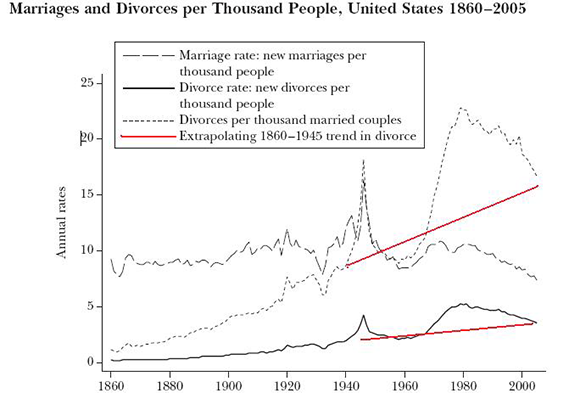
The other thing this graph tells us is that rising divorce rates were a phenomenon very specific to the period about 1965 – 1975. This was a good decade for liberal values, but little moreso than decades before and after it. The strictly time-limited nature of the phenomenon suggests something more specific (and no, it’s not no-fault divorce laws). The Pill, which came out in 1960, is an extremely plausible candidate, but a full treatment of this topic is beyond the scope of this essay.
Now that the obvious objection is out of the way, let’s discuss some less obvious objections. If progressive values cause divorce, how come people with more progressive values are less likely to divorce? College-educated women have about half the divorce rate of the non-college-educated (source). More conservative states have higher divorce rates than more liberal states ( source ). Atheists have divorce rates below the national average ( source ). Some of these factors seem to remain even when controlling for wealth and the other usual confounders ( source, source). The link between sluttiness and stable marriage mentioned above reinforces this point.
I think this data is consistent with the following theory: new technology and changing economic conditions produced a strain on family life that was reflected in an explosion in divorce rates. Society’s memetic immune system sprung into action to contain the damage through the creation of new laws, institutions, and social norms. People who adopted the new ways survived the crisis and their family lives returned to a sort of normal. People who failed to adapt… well, don’t be one of those people.
The new norms created by the memetic immune system are exactly the progressive values that Reactionaries blame for the damage: marrying later, trying more partners, using more contraception, having fewer children.
This theory explains both why the progressive values arise at the same time as the broken families, but also why people with progressive values are less likely to have broken families than others.
The data on illegitimate children and single motherhood mirror the data on divorce and do not require a separate discussion.
5.3. Are we headed for a demographic catastrophe?
First of all, before we pretend that the minutiae of who has which values and who goes to church how many times affects fertility rate much, let’s see the inevitable GDP/fertility rate graph:

And before we worry about the United States experiencing demographic collapse and tumbleweeds rolling through the streets of New York City, let’s double-check to make sure that US population isn’t a near-perfectly straight upward-trending line:

Western Europe?

A few countries do have demographic problems. Singapore, for example, has the lowest fertility rate in the world – 0.79, 224th out of 224 countries. It should probably do something about that. But given that it’s generally accepted to be the most Reactionary country in the world, it’s hard to blame this one on Progressivism or suggest Reactionary values as the answer.
5.3.1. But what if I am racist? Isn’t it possible that fertile minorities and immigrants are hiding a fertility deficit among precious, precious, white people?
According to Edmonston et al’s projection of US racial fertility trends:
In 2100, the total U.S. population will eclipse 550 million people, and the racial composition of the country will be 38.8% white, 30.6% Hispanic, 15.6% black, 14.9% Asian and Pacific Islander, and 1% American Indian.
The absolute number of white people will be only a few million less than today, 209 million. That’s more than enough to run a wide selection of excellent country clubs, or achieve whatever other strategic aims we need a large white population for.
Perhaps most gratifying if you are a racist, the percent of black people will increase only about three percentage points. The biggest increase will be in Asians, a so-called model minority.
After that? If there are still biological humans in organic bodies transmitting genes naturally much after 2100, we have much bigger problems than race on our hands.
5.3.2. Are we headed for an idiocracy?
Poor, uneducated, low-IQ people have higher fertility rates than wealthy, well-educated, high-IQ people in almost all countries. Therefore, one might worry that this will have a dysgenic effect, selecting against genes for intelligence until eventually everyone is stupid or has other undesirable quantities anticorrelated with wealth and education. This was the premise of the movie Idiocracy, and in principle people are far too quick to dismiss it.
But in practice, the effect is too small be significant. Richard Lynn, who is the closest we will get to an expert on dysgenics, calculates that American society as a whole is losing 0.9 IQ points per generation. So by 2100, people will have lost on average 4 IQ points.
Since it’s hard to get a good intuitive graph of what 4 IQ points means, consider that IQ has been increasing by about 3 points per decade (average is still 100, but only because they recalibrate it). So absent any further Flynn Effect, losing 4 IQ points would take us back to… about as smart as we were back in 2000. I won’t say that won’t be unpleasant – the people of that era elected George W. Bush, after all – but it’s not quite convert-all-written-language-to pictograms-because-everyone-has-forgotten-how-to-read level unpleasant.
And what comes after 2100 doesn’t matter, because even on the off chance we’re still using human brains to reason at that point, it sure won’t be human brains in which the genes have been left to chance. To paraphrase Keynes, in the long run we’re all either dead or cyborgs.
5.4. Aren’t modern dogmas about race and sex and sexuality stupid and evil?
Let me be clear here. There is no excuse for the sort of extremist folk social justice crusades one can find on Tumblr or Twitter or Freethought Blogs. With a few treasured exceptions they are full of nasty and hateful people devoid of intellectual integrity and basic human kindness, and I am suitably embarrassed to be in the same 50%-or-so of the political spectrum.
Then again, there are lots of nasty and hateful conservatives and reactionaries devoid of intellectual integrity and basic human kindness too. Go take a look at Free Republic. Maybe we can call it a tie?
But this has surprisingly little bearing on the particular question above. As Christians are obligated by circumstance to point out, an idea is not responsible for the quality of people who hold it. And modern dogmas about race are agreed by very nearly everyone – including most Reactionaries! – including you! – to be both correct and very important.
Three hundred years ago, a pretty high percent of Americans were okay with black people getting kidnapped, enslaved, forced into back-breaking labor on plantations, raped, separated from their children, whipped if they protested, worked to a very early death, and then replaced with other black people.
Nowadays Reactionaries like to think of themselves as racist just because they believe the average black IQ is a standard deviation below the average white IQ. But one standard deviation implies that about a fifth of black people are smarter than the average white person. If you were to go back to 1800 and tell a conference of the most extreme radical abolitionists that you thought a fifth of black people were smarter than the average white person, they would laugh and not stop laughing until they died of laughter-induced asphyxiation.
And at least there the traditional and modern stereotype are still going the same direction. Did you know there used to be a stereotype that Jews were stupid and boorish and didn’t belong in polite society? A stereotype that Chinese people were dumb? A stereotype that black people were bad at sports? To make a corny statistics pun, there seems to be very poor inter-hater reliability.
Homosexuality is little different. Reactionaries take a bold stand against sexually suggestive displays at gay pride parades or whatever, but when it comes to why two people who love each other can’t get married because they’re both the same gender, they tend to be just as confused as the rest of us. Mencius Moldbug writes:
Although I am straight as an iron spear, I happen to see nothing at all wrong with “gay marriage.” In fact I am completely sympathetic to the Universalist view, in which the fact that couples have to be of opposite sexes is a sort of bizarre holdover from the Middle Ages, like the ducking-stool or trial by fire. It’s not clear to me why homosexuality, which obviously has some extremely concrete biological cause, is so common in modern Western populations, but it is what it is. However, because I am straight etc, and also because I’m not a Universalist, I happen to think the issue is not really one of the most pressing concerns facing humanity.
Moldbug is welcome to his opinion on what is or isn’t one of the most pressing concerns facing humanity (I would have said a couple of brain-dead Internet thugs from Gawker beating up on a random Twitter celebrity isn’t one of the most pressing concerns facing humanity, but to each his own) but I wonder if Moldbug notices that merely his unconcern on this issue makes him in let’s say the 95th percentile of most Progressive Americans who have ever lived. 95% of Americans throughout history have been quite certain that eradicating sodomy was one of the most pressing concerns facing humanity, and boy did they act on that belief.
In fact, if we put a Reactionary in a time machine headed backward, and made it stop when the Reactionary was just as racist, sexist, et cetera as the US population average at the time, I predict they wouldn’t make it much past the 1970s. Go into the 1960s and you get laws banning colleges from admitting both black and white students to the same campus (one helpfully specified that the black and white campuses could not be within twenty five miles of one another).
Now, there’s no problem with this – except for Nixon and disco, the 1970s were no worse than any other period. But Reactionaries insist that all Progressivism since 1600 has been part of one vast and monstrous movement – maybe a religious cult, maybe a sinister power-play, maybe just the death throes of the western intellectual tradition – dedicated to being wrong about everything. And that a very big part of this vast movement focused on race. And when they have to whisper “Except we agree with 99% of what it did, right up until the past couple of decades, and in fact they got it right when everyone else was horribly, atrociously wrong”, that is – or at least should be – kind of embarrassing.
5.4.1. But there’s a clear difference between the past policies Reactionaries support and the modern ones they oppose. Past policies were going for equality of opportunity, modern ones for equality of results. Isn’t seeking equality of results laden with too many assumptions?
Arguing about whether a post-racial society should provide equality of opportunity or equality of results is a little like arguing about whether in the worker’s paradise, everyone should have a pony or everyone should have two ponies.
Right now, there is not even equality of opportunity. Rigorous well-controlled study after rigorous well-controlled study has shown that women and minorities face gigantic amounts of baseless discrimination in various areas, most notably employment. This remains true even when, for example, the experiment is sending perfectly identical resumes out to companies but with the photo of a black or white guy at the top.
Once we have equality of opportunity, then we can start debating whether we should go further and try for equality of results. Until then, it’s kind of a moot point.
5.4.2. What about the studies that have shown black people have lower IQ/higher violence/other undesirable trait than white people?
If genetic differences across races prove real, this would be a good argument against seeking equality of results, but no argument at all against continuing to seek equality of opportunity – which, as mentioned above, mountains of rigorous well-controlled studies continue to show we don’t have.
If, as the scientific racists suggest, black people have an average IQ of 85 compared to the white average of 100, then there is still a pretty big civil rights battle to be fought getting the average black person to do as well as the average white person with IQ 85. After controlling for IQ, the average black person is still twice as likely to be in poverty, 50% more likely to be unemployed, and 250% more likely to be in prison ( source, other gaps appear to disappear or reverse once IQ is controlled; see link for a more complete analysis.)
5.4.2.1. But this is exactly the kind of discussion progressives won’t let us have! It is an unquestioned dogma of our society that all cross-racial differences must be based entirely on discrimination! In fact, people educated in public schools are incapable of even conceiving of the possibility that they could be otherwise! How are we supposed to be able to disentangle equality of opportunity from equality of results in such people?
From this Gallup poll:
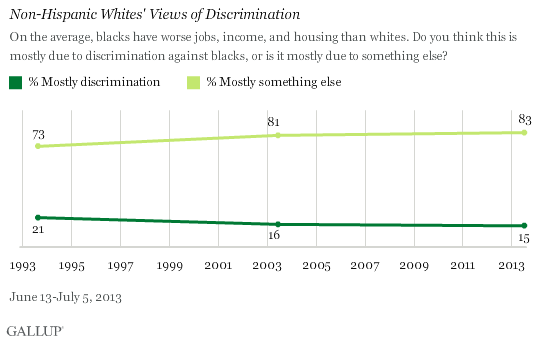
83% of white people agree that the poor position of blacks in society is mostly not due to discrimination.
Want to see something even cooler?
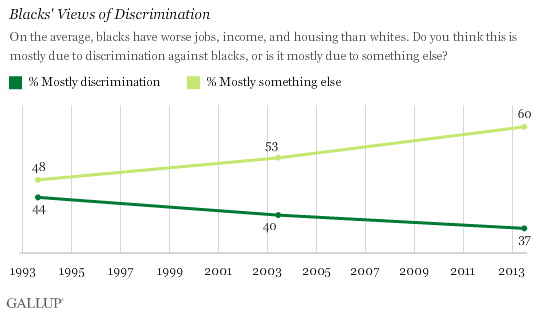
60% of black people agree that the poor position of blacks in society is mostly not due to discrimination.
So no, doubting that all racial disparities in the US are due to discrimination isn’t a thought crime. It’s the majority position, even among black people themselves.
True, the number of people willing to consider genetic differences in particular would probably be far lower. But the great (and very legitimate) fear motivating more-than-academic interest in this question – that white people will forever be blamed for and forced to atone for minorities’ problems – is one that can be talked about productively and perhaps banished.
5.4.3. Even if the establishment has not managed to completely ban all discussion of race that contradicts their own ideas, isn’t it only a matter of time before political correctness takes over completely?
It’s hard to measure the power of the more intellectually bankrupt wing of the social justice movement, but as best I can tell it does not seem to be getting more powerful. According to Rasmussen, support for “political correctness” is declining in America. As we saw above, fewer and fewer people are willing to attribute black-white disparities to “racism” over time. Gallup finds that in the past decade, the percent of blacks satisfied with the way blacks are treated has gone up nearly 10% (I can’t find similar numbers for white people, but I bet they’re similar). Both white and black people are about 25% less likely to consider the justice system racially biased than 20 years ago. The percent of whites who think government should play “a major role” in helping minorities has dropped by 10 percent since 2004; for blacks, there is a similar drop of 14 percent.
The percent of people who think women have equal job opportunities to men has gone up 15% in the past nine years. Women are less likely to identify as feminists than twenty years ago, and support for affirmative action is at historic lows.
Here we see really the most encouraging combination of trends possible: actual racism, perceptions of racism, and concern about racism are all decreasing at the same time.
5.4.3.2. So how come social justice people have been making so much more noise lately?
My guess is changes in the media. The Internet allows small groups to form isolated bubbles and then fester away from the rest of society, becoming more and more extremist and paranoid and certain of themselves as their members feed upon each other in a vicious cycle.
Of course, as Reactionaries, you wouldn’t possibly know anything about that.
At the same time, the relative anonymity of the Internet promotes bad manners and flame wars and general trollishness. It’s not just that the writer is anonymous and therefore doesn’t fear punishment for what he or she says. It’s that their enemy is some nameless evil, rather than a person with a face whom they will treat as a human being.
And again at the same time, the national media has become more and more efficient at detecting outrageous events associated with some small town or some B-list celebrity and publicizing them to the entire world. This allows the hatred of the entire world to be focused on a single random person for a short period of time, which usually results in that person’s life being ruined in a way that would be impossible without this media efficiency.
But these processes are at least partly nonpartisan. With a rise in extremist online social justice has also come a rise in groups that didn’t even exist before, like men’s rights advocates.
I identify the worst parts of the social justice movement as basically reactionary in their outlook, even though from a coalition politics point of view they have been forced to ally with progressives.
Chief in this assessment is their strong beliefs that some topics should be taboo and bowdlerized from society. In the old days, you would ban books because they talked too much about sex. In the new days, we laugh at their prudishness, but still seriously debate banning books because they are “demeaning towards women” or “trivialize rape culture”. The desire to ban books that promote different sexual norms than we ourselves promote hasn’t changed, only the particular sexual norms we are enforcing.
The same is true of race. In the old days, we would ban books that insulted the King or the upper classes. In the new days, we ban books that insult the poor, or disprivileged or disadvantaged classes. Again, the desire to ban books insulting the classes we like doesn’t change, only to which classes we afford this privilege.
Real Progressivism is Enlightenment values – like the belief that free flow of information is more important than any particular person’s desire to “cleanse” society of “unsavory” ideas. Real Reaction is the belief that free expression isn’t as important as making sure people have “the right” values. Upper-class white Reactionaries will try to enforce values protecting upper-class white people. Lower-class minority Reactionaries will try to enforce values protecting lower-class minorities. Whatever. They’re still Reactionary.
Likewise, real Progressivism is color-blind. It may be sophisticatedly color-blind, which involves realizing that just saying “I’m going to be color-blind now, okay?” doesn’t work, and that affirmative-action type policies may paradoxically lead to more genuinely color-blind results. But it would be unlikely to promote the idea that people should have racial pride, or that one particular race is evil and is not allowed to have racial pride. “White people should identify strongly with white culture; black people have no culture” is the upper-class white Reactionary slogan. “Black people should identify strongly with black culture; white people have no culture” is the lower-class minority Reactionary slogan. “Lots of races have culture but let’s ignore them and let individuals identify with what they personally like” is the academically-neglected but still-popular true Progressive position.
Finally, real Progressivism opposes segregation in all its forms. Upper-class white Reaction says that it’s necessary to protect white people from being “polluted” by black culture like rap music. Lower-class minority Reaction says that it’s necessary to stop white people from “appropriating” black culture like rap music. Either way, we get white people not allowed to listen to rap music. Progressivism is the position contrary to both: that everyone can listen to whatever music they damn well please.
The conservative nature of social justice isn’t surprising if you, like me, believe the liberal/conservative divide mirrors a self-expression/survival divide – more simply, whether or not you feel safe. As society becomes more economically and politically secure, we expect it to become more liberal and progressive. But we also expect the subgroups of society that are least secure to remain conservative, and to continue to use conservative strategies to protect themselves in their unsafe environment. Those subgroups are women and minorities.
Because more liberal white people are more likely to be tolerant toward minorities and the poor, minorities and the poor are by political necessity forced to ally with liberal parties. But when we are able to separate issues out from political coalition-building and self-interest, the natural tendency of economically and physically insecure minorities to be more socially conservative shows itself. Black people are more religious, more likely to support amendments banning gay marriage, and more likely to oppose stem cell research, abortion, and out of wedlock births.
If you do not like certain extreme versions of social justice, then fighting their Reactionary memes favoring poor minorities with your own Reactionary memes favoring rich whites is unlikely to work. At best you would just end up with two angry clans demanding more power for them personally; more likely financial and signaling incentives will prevent rich whites from wanting to take their own side in a conflict and everyone will just ignore you. A better strategy would be to take the moral high ground and promote Progressive memes to both sides.
5.5. Is our society hopelessly biased in favor of minorities and prejudiced against white people?
The most visible parts of society, like affirmative action and conversational norms around political correctness, are biased in favor of minorities and against white people. But this is intended to counter less visible parts of society, which are biased in favor of white people and against minorities. Whether this gambit works is anyone’s guess. See An analysis of the formalist account of power structures in democratic societies for a more careful evaluation of this claim.
5.6. One particularly annoying politically correct idea is the demand that everyone feel guilty about colonialism. Colonialism helped industrialize the developing world. Wasn’t the Progressive attempt to “help” the developing world through enforced decolonization and self-rule actually a big step backwards?
There are a couple of studies on this question, but all have their issues. A particular problem in the comparison of colonized to uncolonized countries is the possibility that more prosperous countries would be more likely to attract colonization and more likely to successfully resist potential colonizers. This makes an attempt to formally compare colonized with never-colonized countries directly nearly impossible.
I am least dissatisfied with Sylwester 2005, which compares colonial countries before, during, and after decolonization. It finds that:
There was no decrease in growth [for newly independent countries] relative to the alternative of remaining a colony. The reason why decolonizers exhibited lower growth than did those not concurrently undergoing a political change is that decolonizers grew slower than did nascent countries. These results provide evidence against the claim that this type of political transition caused lower growth than experienced previously. There is no evidence of transitional costs.
The paper also finds that previously independent countries grew faster than did the existing colonies. Whether or not a region is independent or controlled by an external power appears important for growth outcomes”
In other words, countries grew faster after independence than they did as a colony. This provides some support for the leftist idea that colonial powers drained more resources than they introduced, at least towards the end of the colonial age.
5.6.1. Forget economics, then. Wasn’t decolonization a human rights disaster, considering all the civil wars and coups and mismanagement in former colonies that could have been prevented by a competent colonial government?
Everyone from every side of the political spectrum agrees decolonization could have been handled better. It might be that no decolonization at all would have been better than decolonization the way the Great Powers historically went about it. And it’s hard to excuse all the civil wars and mismanagement that caused.
On the other hand, the colonial era wasn’t exactly free of bloody wars either. Colonial wars included the Mahdist War (100,000 deaths), the Algerian Revolution (500,000 – 1.5 million deaths), the Rif War (70,000 deaths), the Italian-Ethiopian War (500,000 deaths), the Mau Mau Rebellion (20,000 deaths), Mozambique War Of Independence (80,000 deaths), Angolan War of Independence (50,000 deaths), the Herero Genocide (100,000 deaths), the Java Wars (200,000 deaths), (~100,000 deaths), the Mad Mullah Jihad (100,000 deaths, but on the brighter side, an awesome name) Philippine-American War (220,000 deaths), First Indochina War (200,000 deaths), Aceh War (100,000 deaths) et cetera, et cetera, et cetera.
If we don’t limit ourselves to just wars, and include famines, genocides, and general mismanagement, we can add Congo Free State (8 million deaths), genocide of Brazilian Indians (?200,000 deaths), forced labor in Portuguese colonies (250,000 deaths), forced labor in French colonies (200,000 deaths), Italian colonial genocide in Libya (125,000 deaths), French colonization of Algeria (500,000 deaths, European eradication of Native Americans (350,000 deaths), and the Australian and New Zealander eradication of aborigines and Maori (440,000 deaths). If we are willing to count famines worsened by colonial mismanagement we can go almost arbitrarily high, 20 million deaths or more.
It is certainly possible to imagine a wise and paternalistic colonial government coming in, cleaning up after native misrule, and introducing things like sanitation and industrialization. But that’s not what happened. It’s not fair to compare an imaginary ideal version of one policy with the real-world version of another.
5.6.1.1. Weren’t a lot of those colonial wars and human rights abuses actually caused by demotism and Progressivism? If people hadn’t revolted against their colonial masters, there wouldn’t have been these bloody colonial revolts.
Not a straw man! The first answer is that even if we accept this weird premise, there are still hundreds of colonial atrocities that do not stand excused. Many of the above conflicts occurred during original colonial invasions, and a tendency to resist those hardly requires demotism. Others were simple genocides, during which resistance was minimal.
But let’s not accept the premise. I admit placing blame is complicated. To give just one example, thousands of homosexuals were killed in Nazi Germany. We usually blame the Nazis for this. But from a formal math point of view, it would be equally valid to blame homosexuality. After all, if not for homosexuality, those people would not have been killed, Nazis or no.
How to avoid such bizarre conclusions? One method is moral – even if both Nazism and homosexuality were to blame according to purely mathematical casual models, Nazism seems more morally to blame. Another method is practical- homosexuality is as old as the human race and probably not going away, so it’s easier to view homosexuality as a constant and vary Nazism than it is to hold Nazism as constant and vary homosexuality.
We can apply these same methods to the colonial wars. Morally, the colonized people seemed to be morally in the right – they were sitting around trying to live their ordinary lives when people invaded and tried to turn them into forced laborers. And practically, the desire for self-rule is older and harder to root out than the colonialism. Indeed, colonialism pretty much died off after a century or two, and the desire for self-rule is stronger than ever.
Some Reactionaries would contest this hypothesis. They would say that it is only the spread of Progressive ideas that make people want to revolt against their colonial masters – that if not for the New York Times deliberately sowing pre-revolt memes, no one would consider this a worthwhile thing to try.
Historical counterexamples abound, but the Jewish-Roman Wars (66-135 AD) seem like a particularly good one. If they don’t appeal to you for some reason, pick your own favorite example out of Wikipedia’s List of revolutions and rebellions.
And as we saw above, if Progressivism is an inevitable historical reaction to rising technology and security, rather than a meme spread by the New York Times or anyone else, then saying “My scheme would have worked if not for the spread of Progressive ideas” is no more virtuous than saying “My scheme would have worked if not for the conservation of matter”. Congratulations, you’ve found something that might have been a good idea in an alternate universe that ran on different rules.
5.6.2. Even if colonialism was historically bloody, wouldn’t today’s human-rights-obsessed, racism-hating era be able to sustain a type of colonialism that gives the good parts without the evil?
Yes, it’s possible that modern progressive ideals would be able to rescue colonialism. But it’s hard to imagine a nation being simultaneously progressive enough to colonize other countries wisely, but still so unprogressive that it would want to. It would have to be a country whose progressivism evolved on a path much different to our own.
5.7. Are schools are places where children get brainwashed into leftist and blame-America-first values? Are all parts of history that don’t fit with a progressive worldview whitewashed from the curriculum?
Our source here is James Donald, who for example says:
History gets radically rewritten at ever shorter intervals, and all older history books are effectively banned. Consider, for example the ever more radical rewrites of the career of Daniel Boone, which ended with him being expelled from history altogether, and that today’s student has no idea what “The shores of Tripoli” refers to. Ninety nine percent of what students used to be taught not very long ago, is now unthinkably controversial, shocking, and disturbing…
Look [these things] up in a history book written before the days of hate-America-first history. The New Century Speaker for School and College, published 1905.
Of course this would require you to read old books, but old books are like kryptonite to a progressive. Since they were written by dead white males, no respectable person will read them for fear that dangerous and forbidden thoughts might contaminate his brain. Like a vampire confronted with a bible, a progressive will cringe in fear before any dangerously old book. Ever since 1905 or so, kids have been taught hate-america-first history.
I worry James is confusing the sign of a value with the sign of its derivative. Certainly schools are becoming more willing to discuss leftist issues. But are they now disproportionately willing to discuss them?
Let’s take the example of Columbus. Modern Americans are taught not only the old history that Columbus was a brave explorer who sailed forth to boldly discover that the Earth was round, but also the new history of “yeah, but he was bad for the Indians”. The feeling I got was that sure, Columbus was all nice and well, but his bold voyages paved the way for later people to settle the New World which sort of by coincidence hurt the Indians because people were squatting on their ancestral lands. This is about as far as so-called liberal schools will go, and this is probably the sort of progressivism being introduced to history classes which James is complaining about.
But actually, Columbus was… well, The Oatmeal is kind of a low-status source to link to, but I think they said this one better than I could. It starts off with :
Upon his arrival, he demanded that the Lucayan [Indians] give his men food and gold, and allow him to have sex with their women. When the Lucayans refused, Columbus responded by ordering that their ears and noses be cut off, so that the now disfigured offenders could return to their villages and serve as a warning to others. Eventually, the natives rebelled. Columbus saw this as a perfect excuse to go to war, and with heavily armed troops and advanced weaponry, it wound up being a very short war. The natives were quickly slaughtered… there are eyewitness accounts of fallen Lucayan warriors being fed to hunting dogs while they were still alive, screaming and wailing in agony as the dogs feasted on their limbs and entrails.
(a commenter points out that some of its other claims are exaggerated)
As much as James may complain about how people vaguely mutter about something something Indians something on Columbus Day, I bet he didn’t learn this in school. In fact despite his protestations, I bet he didn’t learn very much leftist history at all in school, given that he thought Eugene V. Debs was a Supreme Court case.
One day, our school curriculum may become so leftist that the Right needs a book like A People’s History of the United States or Lies My Teacher Told Me (which was created not by armchair contemplation of what society’s biases must be, but by reading twelve actual history textbooks and spotting the actual lies in them). But that day hasn’t come yet.
What is James’ own evidence for a leftist bias? As far as I can tell, they’re things like that US classrooms keep going on about US enslavement of black people, but never mention the (African) Barbary Pirates enslaving white Americans. But this may have less to do with liberal bias and more to do with the fact that, as far as I can tell, only 115 white Americans were ever enslaved by the Barbary Pirates (and then released a few years later), whereas about 500,000 African slaves were brought to America, kept in slavery for centuries, precipitated the bloodiest war in our country’s history, and then became a racial group that makes up 12% of Americans today – over forty million people.
Oh, and actually, I did learn about the Barbary Pirates in history class, thank you very much. So it seems that prediction of James’ has been disconfirmed. Although he seems to have thought the government shutdown might end with Tea Party members and lawmakers being shipped to concentration camps, so I imagine having his predictions disconfirmed is a pretty common occurrence for him.
I apologize for the insulting tone of this FAQ entry, but I was accused of cringing in fear before old books, and being vampire-to-Bible-level afraid to study history. That hurts.
6. Any last thoughts?
6.1. Does this mean you hate Reactionary ideas and think they have nothing to teach you?
Absolutely not. Compare to communism. The people who called themselves communists had some great ideas, like shorter workweeks and racial equality. It was just that the narrative they used as a framework for that idea – historical dialectic, workers controlling the means of production, violent revolution, destruction of capitalism, destruction of democracy – were horrible. Their ability to notice problems tended to be better than their specific policy proposals which in turn tended to be better than their flights of fancy.
I feel the same way about Reaction. Some Reactionaries are saying things about society that need to be said. A few even have good policy proposals. But couching them in a narrative that talks about the wonders of feudalism and the evils of the Cathedral and how we should replace democracy with an absolute monarch just discredits them entirely.
6.1.1. What exactly do you like about Reaction?
I like that they’re honestly utopian. Their scathing attacks on everyone else for being utopian merely punctuate the fact, like the fire-and-brimstone preacher denouncing homosexuality whom everyone knows is secretly gay. The Reactionaries wants to throw out the extremely carefully fine-tuned machinery of modern society which evolved over several hundred years, and replace it with a bizarre Frankenstein’s Monster of modern and traditional elements that they dreamed up in an armchair, which has never been tried before and which, they say, will instantly fix all social ills like crime and poverty and war.
And this is awesome. Utopianism – trying to think up amazing political systems that lie outside the local Overton Window – is very nearly a dead art. The failure of the Communists’ utopian designs probably killed it – the Right made “utopianism” into a dirty word so they could use it to bludgeon the Left, and the Left turned against utopianism en masse to avoid getting bludgeoned. Right now the only two permissible dreams of a better future are a society much like our own but a little more libertarian, or a society much like our own but a little more progressive. Boring!
The more utopian ideas we have the more sources we have to draw from when trying to decide which direction our own society should go in, and the broader the discourse becomes. Reactionaries are geniuses at inventing new systems that have never been tried before and some of whose components deserve serious contemplation. And if there was a science fiction book set in Moldbug’s Patchwork or Royal California, I would buy it.
6.1.1.1. But?
There are a few good things you can do with utopianism.
You can use it as a generator for ideas that become gradually adopted into the mainstream, as mentioned above. Communism was good at this – in the US, instead of starting a revolution, they just helped spark the modern labor movement, which eventually came to coexist with the rest of the economy and is now probably a useful part of the memetic ecosystem.
You can use it to start interesting intentional communities. There were a couple of communist communes within capitalist countries; some people even built phalansteries, and more modern versions like Twin Oaks are more successful. You can start a non-communal subculture, like the polyamory movement. If you happen to have a free land, you start a country or subnational government – it worked for the early American settlers, and it may yet work for seasteaders. The Free State Project is another noble goal along these lines.
But until it works in an intentional community or something, trying to push it on everyone else seems premature and irresponsible.
6.1.2. If we don’t do Reaction, does that mean we’re stuck with a boring inoffensive centrist democracy forever and ever?
No. There are lots of extremely creative ideas for radical new forms of government that don’t involve any Reactionary ideas at all. The better ones are off of the right-left spectrum entirely. Futarchy is my favorite. Or we could all just go live in the Shining Garden of Kai-Raikoth.
6.2.1. Has anyone written a response or rebuttal to this FAQ?
Ohhhhhh yes.
I am indebted to Reactionary blogger Legionnaire for putting together a good list of responses to this document, which I am reproducing here with only minor aesthetic changes.
Responses To Part 1: Is Everything Getting Worse?
- Foseti – An Anti-Reaction FAQ
- Xenosystems – The Decline Frame
- Jim – Anti-Anti-Reactionary FAQ Part 2: Crime
- More Right (Michael Anissimov) – Response to Anti-Reactionary FAQ, Lightning Round, Part 1
Responses To Part 2: Are Traditional Monarchies Better Places To Live?
- Jim – Anti-Anti-Reactionary FAQ Part 1: Terror And Mass Murder
- (this limited its complaint to a single example and seemed quite fair, so I have since removed that example from this document)
- Jim – Anti-Anti-Reactionary FAQ Part 3: Freedom And Monarchy
- More Right (Michael Anissimov) – Response To Anti-Reactionary FAQ Part 2: Austrian Edition
Responses To Part 3: What Is Progress?
- Jim – Progress
- Jim – Anti-Anti-Reactionary FAQ Part 4: Ever Leftwards Movement
- Anarcho-Papist – The Theory Of Demotist Singularity
- Habitable Worlds – The Motives Of Social Policy
Responses To Part 4: Should A Country Be Ruled As A Joint-Stock Corporation?
Responses To Part 5: Are Modern Ideas About Race And Gender Wrong-Headed And Dangerous?
- Anarcho-Papist – On The Opposition To Sluttiness, Among Other Things
- Free Northerner – Sex: A Response To Scott Alexander
- Jim – The Anti-Anti-Reactionary FAQ: Sluts
Miscellaneous Responses
I’ve only managed to read about 50% of these so far, but of the ones I have read, I am especially impressed with Anissimov’s Lightning Round Part 1 and Free Northerner’s post on sex issues as well-argued and pretty comprehensive critiques.
I will continue to update based on his list as a definitive resource, but if you’ve written something and want on here, post in the comments of this thread or email me and I will eventually get you up. This is likely to update very irregularly.